Wednesday, March 21, 2007
Why You Should Look At 200-day MA before investing
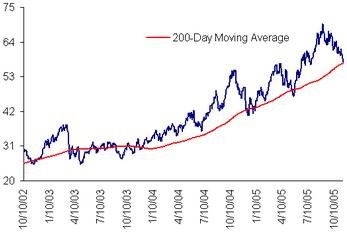 Even analysts and portfolio managers who only looked at fundamental research and didn't believe at all in technical analysis would look at this one indicator. These portfolio managers and analysts that work for big mutual funds, pension plans and hedge funds represent the institutional money in the market, and they are considered the "big players" in the market place. Regardless whether you like it or not, these "big players" feel comfortable putting money to work in a stock market when they are trading above their 200-day MA. So you better follow these market makers unless you plan to burn all your hard-earned money into the chimney.
Even analysts and portfolio managers who only looked at fundamental research and didn't believe at all in technical analysis would look at this one indicator. These portfolio managers and analysts that work for big mutual funds, pension plans and hedge funds represent the institutional money in the market, and they are considered the "big players" in the market place. Regardless whether you like it or not, these "big players" feel comfortable putting money to work in a stock market when they are trading above their 200-day MA. So you better follow these market makers unless you plan to burn all your hard-earned money into the chimney.When the stock or market falls below the 200-day MA, the big-boys are less likely to put new money to work in that particular stock or market or to defend their position if the stock or market drops. This behavior repeats itself without fail so knowing the pattern is one of the pre-requisities for traders or investors like you and me.
So, you have to remember that the 200-day MA is the cut-off in determining whether a stock or market is in a bull market or a bear market. You should take long trades after you get a buy signal ONLY if the stock or market is above its 200-day MA. Also, you should take short positions after you get a sell signal ONLY if the stock or market is below its 200-day MA. What is so special, you might ask, about this 200-day MA compare to other technical indicators, which will tell you whether we’re in bull or bear market? The main reason has already been stated above, that is majority follows the pattern. But most importantly it’s the perception and the psychological factors that will move the stock in an unstoppable big-wave. You simply can’t fight against the strength of the current.
And rest assured that this indicator was being tested over and over again by thousands of analysts before. It’s proven to be highly reliable. Of course you might want to mix 200-day MA with other technical indicators to give you a higher percentage of accuracy and comfort before you decided to dive into the stocks.
Tuesday, March 20, 2007
Scrapping Real Property Gains Tax – Tonic for Stocks?
S
 ources say it is likely that an announcement on the matter will be made during theInvest Malaysia 2007 conference jointly organised by Bursa Malaysia (KLSE:BURSA, stock-code 1818), RHB Investment Bank and UBS (NYSE:UBS, stock) Securities.
ources say it is likely that an announcement on the matter will be made during theInvest Malaysia 2007 conference jointly organised by Bursa Malaysia (KLSE:BURSA, stock-code 1818), RHB Investment Bank and UBS (NYSE:UBS, stock) Securities.RPGT is a tax on profits from a sale of properties less than five years after they were bought. Only the profit arising from the disposal of a property is subject to RPGT. The tax will be assessed based on a percentage ranging between 5% and 30%, depending on how long the seller has held the property. For Malaysian individuals, there is no RPGT if the property is disposed of after five years. For foreigners, a flat rate of 30% is applicable within five years from the purchase of the property, and 5% on the sixth and subsequent years.
There’re even talks of stamp duty on property transactions being waived on top of the abolishment of RPGT. Stamp duty waiver would be the more significant factor given that it is based on the total purchase value. Example: a two-and-a-half-storey house worth about RM 628,000 will attract a stamp duty of RM 12,000 - a small figure percentage-wise, but a large sum in absolute terms.
 With property prices in Malaysia being generally cheaper, and with the ringgit still considered a cheap currency, observers feel that any liberalisation in the property sector could see foreigners pumping money into the sector.
With property prices in Malaysia being generally cheaper, and with the ringgit still considered a cheap currency, observers feel that any liberalisation in the property sector could see foreigners pumping money into the sector.
Back to main justification that Malaysian government will most likely abolish RPGT is the fact that the rosy economic picture painted is not that promising after all. Historically, stocks bull-run will fill-over directly into property sector – people who made tons of profit from the stock market will have nowhere to park their money but to property, obviously. That was exactly what happened during the 1993 Super-Bull run. People were seen laughing their ways to the bank by buying and selling properties with minimal booking fees. The speculation caused the property prices skyrocketed in an alarming rate that the government introduced the RPGT.
But at current situation, the property market is not attracting the expected demand, if the so-called current bull-run is used as the gauge against the 1993’s bull. Needing a shot in the arm desperately, the government needs to see the property sector to take off in great strength if it wants to see the Iskandar Development Region (IDR) to even attract some excitement amongst the voters in preparing for the coming general election. Already the IDR project has all the doubts of success if you were to conduct an interview with person on the street. However, the abolishment of RPGT will definitely boost the property sector and hopefully it will create the wealth the same way before.
Amongst beneficiaries of property companies are players such as:
Other Articles That May Interest You ...
Saturday, March 17, 2007
Teh Hong Piow - Malaysian's Warren Buffett
Instead of confrontational tone set during question and answer
 session which is a norm with most of the listed companies AGM in Malaysia, Public Bank’s was full of praise, applause and laughter amid a sprinkling of serious queries from shareholders who had scrutinised the accounts of the bank.
session which is a norm with most of the listed companies AGM in Malaysia, Public Bank’s was full of praise, applause and laughter amid a sprinkling of serious queries from shareholders who had scrutinised the accounts of the bank.The Minority Shareholders Watchdog Group CEO Abdul Wahab Jaafar Sidek, who was full of praise for Public Bank’s management and performance and described the way the AGM was conducted as professional, set the tone for the rest of the meeting. And you can’t blame them for being so tame if you haven’t seen the performance of Public Bank yourself.
After 40 years of uninterrupted profit growth, a shareholder of 1,000 Public Bank shares in 1967 would now be owner of 129,720 Public Bank shares worth a whopping RM1.16mil. Together with RM 391,000 paid out in gross dividends, Teh said the net worth of the 1,000 shares would be RM1.55mil, which represented a compounded annual return of 20% for each of the 39 years. Teh Hong Piow could be the only person who can matches Warren Buffett’s record as far as generating profit to shareholders in Malaysia.
Supposing you’re not so lucky and only able to own Public Bank stocks since the start of 2002 when the shares were worth RM5 each. That would have reaped a return of 122% over the five-year period to date, compared with a 58% rise in the KL Composite Index.
The country’s second largest bank by market capitalisation has ruled out further mergers and acquisitions, telling its shareholders at its AGM yesterday that Public Bank’s focus on expansion lies in tapping new markets, especially abroad where it has a presence. Public Bank said its international focus was to grow its business in Hong Kong and Indochina, as contribution from operations in China was still small.
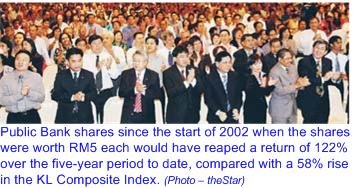 The group’s Hong Kong operation now comprises 56 branches and it has two branches in Shenzhen, China. Public Bank aims to open between 10 and 15 new branches in Hong Kong and a minimum of five in Cambodia this year. The banking group’s international operations contributed 14% of pre-tax profit last year and that came mainly from Hong Kong and Indo-China.
The group’s Hong Kong operation now comprises 56 branches and it has two branches in Shenzhen, China. Public Bank aims to open between 10 and 15 new branches in Hong Kong and a minimum of five in Cambodia this year. The banking group’s international operations contributed 14% of pre-tax profit last year and that came mainly from Hong Kong and Indo-China.
In response to questions raised by the Minority Shareholders Watchdog Group, Public Bank Bhd said it is targeting to start an Islamic banking subsidiary by the end of the year or early next year (2008). Public Bank expects its Islamic banking and finance business to contribute a higher proportion of its income in future as it expands this business. If only Malaysian's public listed companies' captain takes care of all the shareholders' interest the way Teh Hong Piow did...
# TIP: Investing in Public Bank stock (on stages and on pullback) for long-term as part of your diversification strategy.
Friday, March 16, 2007
Smaller and Newcomers Won WiMAX Licenses
- Bizsurf (M) Sdn Bhd - 50%-associate of YTL e-Solutions
- MIB Comm Sdn Bhd - 55% subsidiary of Green Packet
- Redtone-CNX Broadband Sdn Bhd - subsidiary of REDtone International Bhd
- Asiaspace Dotcom Sdn Bhd - telecommunications and broadcast infrastructure company that was previously awarded the rights to build 50 cellular base stations in 2003
 Malaysian Communications and Multimedia Commission (MCMC) said Bizsurf was awarded the 2330 to 2360 bandwidth, MIB 2360 to 2390, Asiaspace 2300 to 2330 and Redtone-CNX the 2375 to 2400 bandwidth. Except for Redtone-CNX, whose areas of operation are Sabah and Sarawak, the others will deploy their services in Peninsular Malaysia.
Malaysian Communications and Multimedia Commission (MCMC) said Bizsurf was awarded the 2330 to 2360 bandwidth, MIB 2360 to 2390, Asiaspace 2300 to 2330 and Redtone-CNX the 2375 to 2400 bandwidth. Except for Redtone-CNX, whose areas of operation are Sabah and Sarawak, the others will deploy their services in Peninsular Malaysia.
A total of 17 companies including Telekom Malaysia Berhad (KLSE: TM, stock-code 4863),Maxis Communications Berhad (KLSE: MAXIS, stock-code 5051) and DIGI.com Berhad(KLSE: DIGI, stock-code 6947) had submitted bids for the WiMAX license.
WiMAX - short for wireless interoperability for microwave access - allows super high-speed Internet access and file downloads from laptops, phones or other mobile devices over greater distances than previous technologies. WiMAX can blanket entire cities with high-speed wireless connections and is a longer-range version of the popular WiFi technology used to connect to the Internet in public spaces such as coffee shops. It is cheaper to set up and run than the high-speed 3G connection for mobile phones.
 MCMC expects the companies to invest between RM250-RM300 million each during the first three years of operations. “We expect the winners to quickly roll out the service to 25% of the population in the area given to them by the end of this year, with a service provision of at least 1MBps at affordable rates. At the end of the third year, it is expected that they will be able to roll services to at least 40% of the population in the areas given to them,” MCMC said.
MCMC expects the companies to invest between RM250-RM300 million each during the first three years of operations. “We expect the winners to quickly roll out the service to 25% of the population in the area given to them by the end of this year, with a service provision of at least 1MBps at affordable rates. At the end of the third year, it is expected that they will be able to roll services to at least 40% of the population in the areas given to them,” MCMC said.
 Analysts say the decision to award the licences for WiMAX - an emerging mobile broadband technology - to smaller companies is aimed at accelerating competition to meet its objective of wirelessly connecting more households. Malaysia badly lags more tech savvy nations such as Singapore and South Korea, despite a decade-long plan to become a high-tech nation.
Analysts say the decision to award the licences for WiMAX - an emerging mobile broadband technology - to smaller companies is aimed at accelerating competition to meet its objective of wirelessly connecting more households. Malaysia badly lags more tech savvy nations such as Singapore and South Korea, despite a decade-long plan to become a high-tech nation.
 Of the four winners, Green Packet Berhad could probably be the only one who will lead the roll-out of services with the WiMAX licenses awarded. Green Packet’s SONmetro solution is also being conducted in Bahrain, Singapore, China, Hong Kong and Europe. SONmetro is Green Packet’s existing wireless broadband network solution. But rumors in the market was that something is fishy about MIB Comm Sdn Bhd as it was a 3-months-old company being registered early in Jan-2007 (could it be that "Men-In-Black" already knew it'll definitely get a license?). Redtone is the next one who probably could deliver the service to Sabah and Sarawak based on its’ good track record, experience, capabilities and leading edge in innovation.
Of the four winners, Green Packet Berhad could probably be the only one who will lead the roll-out of services with the WiMAX licenses awarded. Green Packet’s SONmetro solution is also being conducted in Bahrain, Singapore, China, Hong Kong and Europe. SONmetro is Green Packet’s existing wireless broadband network solution. But rumors in the market was that something is fishy about MIB Comm Sdn Bhd as it was a 3-months-old company being registered early in Jan-2007 (could it be that "Men-In-Black" already knew it'll definitely get a license?). Redtone is the next one who probably could deliver the service to Sabah and Sarawak based on its’ good track record, experience, capabilities and leading edge in innovation.
Without DIGI.com Berhad (KLSE: DIGI, stock-code 6947) in the picture, the game will not be as exciting as it should be. It’s just like a World Cup without the presence of Brazil – there won’t be samba to keep the spectators (consumers in this case) entertained.
Other Articles That May Interest You ...
Lost Again - What Should DIGI Do Next?
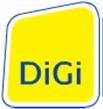 Already DIGI is required to sell-down to the allowed 49% limit for foreign companies. Telenor, the parent of DIGI seems to be losing more cards in growing the telecommunication business in Malaysia and decided to do what most of the foreign investors will do – to suck up the coffer as dry as possible. The strategy of the Malaysian government in saving the very-sick Time DotCom Berhad (this company was one of the listed companies which the shares were “Under-Subscribe” during the IPO) is to award the 3G license to it and deny DIGI of one. DIGI was then pressured to “work with” Time DotCom – a way to get DIGI to pour its’ money and expertise into Time DotCom.
Already DIGI is required to sell-down to the allowed 49% limit for foreign companies. Telenor, the parent of DIGI seems to be losing more cards in growing the telecommunication business in Malaysia and decided to do what most of the foreign investors will do – to suck up the coffer as dry as possible. The strategy of the Malaysian government in saving the very-sick Time DotCom Berhad (this company was one of the listed companies which the shares were “Under-Subscribe” during the IPO) is to award the 3G license to it and deny DIGI of one. DIGI was then pressured to “work with” Time DotCom – a way to get DIGI to pour its’ money and expertise into Time DotCom.Unfortunately DIGI didn’t take the bait and was willing to survive alone without any of the 3G. Time DotCom was then rumored to move into second gear of trying to acquire DIGI (which was denied by Time DotCom) but with the support and backup from the government, it’s a matter of time before DIGI needs to raise the white flag. An instruction is all it needs to buy over DIGI via share-swap (the cheapest way). So DIGI pushed up the stock price to the unbelievable RM 17.00 a share to prevent a possible hostile takeover. With Time DotCom stock price at RM 0.80, it’s a ratio of almost 21 Time DotCom’s share to 1 DIGI’s share.
Of course, money solves tons of problem and if Time DotCom or its’ backers really push all the ways, DIGI will be at the losing end ultimately. What Telenor wants is to get as much money as possible from DIGI in the event it’s being elbowed out of business. Furthermore, DIGI is not spending as much as before (practically) on any hardware or software which could be terms liabilities and could not be transferred out from Malaysia. To further sucks the coffer dry, DIGI proposed high dividend with the aim of slowly but surely reward the shareholders, in this case Telenor itself. So who do you think is the winner and smarter? Maybe DIGI should just wait and see if the new winners of WiMAX can deliver what the government was hoping for.
OPEC Maintain Production Level – Time to Make Money
Retail gasoline prices in the United States have been rising since the beginning of the year and reached about $2.60 a gallon on average last week, nearly 40 cents more than in January.Economists are pretty
 sure the price will shoot up to $3.00 a gallon soon.
sure the price will shoot up to $3.00 a gallon soon.Oil prices have settled around $60 a barrel in recent months and members of the OPEC seem satisfied with that level. In 2006, OPEC which pumps about a third of the world’s crude oil cut its production levels twice to prevent prices from falling below $50 a barrel.
“We are watching developments on world stock markets to assess their possible impact on the global economy and, in particular, on energy demand,” said Mohamed bin Dhaen al-Hamli, OPEC’s president and the oil minister from the United Arab Emirates.
 Consumers in developed countries can expect another summer of high gasoline prices and stiff energy bills with the solid demand for the black gold. On the other hand, consumers in “developing” countries such as Malaysia who created unsatisfaction amongst the people with the fuel-hike in 2006, any further hike will create dilemma to the government who is speculated to call for a snap election very soon.
Consumers in developed countries can expect another summer of high gasoline prices and stiff energy bills with the solid demand for the black gold. On the other hand, consumers in “developing” countries such as Malaysia who created unsatisfaction amongst the people with the fuel-hike in 2006, any further hike will create dilemma to the government who is speculated to call for a snap election very soon.Anyway, with such perception that the supply is tight, it’s only logical to look at the prospect of how to make money from energy-relaated stock counters.
Some of the oil-related stocks to be focused include:
- Transocean Inc. (NYSE: RIG, stock) - primary business is to contract these drilling rigs, related equipment and work crews primarily on a day-rate basis to drill oil and gas wells - specializes in sectors of the offshore drilling business with a focus on deepwater and harsh environment drilling services.
- Valero Energy Corporation (NYSE : VLO, quote) - owns and operates 18 refineries located in the United States, Canada and Aruba that produce refined products, such as reformulated gasoline (RFG), gasoline meeting the specifications of the California Air Resources Board (CARB), CARB diesel fuel, low-sulfur diesel fuel and oxygenates (liquid hydrocarbon compounds containing oxygen).
# TIP: If you decided to do option trading, remember to buy option with time-value of at least six-months expiration.
Thursday, March 15, 2007
Ring Register & Run After QualComm Stock Heats Up
So, there I was on Jan-24-2007 right before the earning with my research that pointed to a good quarter. It gapped-up for a short-while before dived into territory lower than before the earning announcement. It took another three more trading weeks to settle at the peak but $44 seems to be a strong resistance for it to breach. I didn’t sell at this profitable area and I was punished dearly for this mistake. It went into consolidation phase just above $39 before rebound. The good news set to come in then.
 On Mar-13-2007, Qualcomm shares climbed after the chip maker raised its sales and earnings forecast for the coming quarter - sees revenue of $2.1 billion to $2.2 billion during the second fiscal quarter ending in June, compared to the previously forecast $2.0 billion to $2.1 billion. Earnings per share will be between 41 cents and 42 cents, compared to the 35-37 cents range previously forecast. The company thinks it will ship around 60-61 million Mobile Station Modem chips during the June quarter, compared to a prior estimate of 55-57 million units.
On Mar-13-2007, Qualcomm shares climbed after the chip maker raised its sales and earnings forecast for the coming quarter - sees revenue of $2.1 billion to $2.2 billion during the second fiscal quarter ending in June, compared to the previously forecast $2.0 billion to $2.1 billion. Earnings per share will be between 41 cents and 42 cents, compared to the 35-37 cents range previously forecast. The company thinks it will ship around 60-61 million Mobile Station Modem chips during the June quarter, compared to a prior estimate of 55-57 million units.
Investors have been watching Qualcomm's sales closely as the company has been embroiled inlegal battles. Cell-phone giant Nokia Corporation (NYSE: NOK, stock), a client whose license agreement with Qualcomm expires in April, 2007, claims Qualcomm is using Nokia's 1,800 patents for wireless devices to extract outsize royalties on products. Meanwhile, Qualcomm's chipmaker rivals, led by BroadcomCorp. (Nasdaq: BRCM, stock), say they are being denied licenses to key technologies at reasonable rates.
"Despite our view of near-term customer and legal risks with with respect to Nokia and other firms, we would hold QCOM shares," said Standard & Poor's equity analyst Ken Leon in a research note. Qualcomm also announced that it will increase its dividend from 12 cents to 14 cents per share for quarterly dividends payable after Mar. 30, 2007.
 I didn’t think twice and close the position since I think this is the only chance for me to flee after the China and U.S. stock’s volatility. Too bad I can’t make 100 percent profit on this stock. Human can never run away from greed, can they?
I didn’t think twice and close the position since I think this is the only chance for me to flee after the China and U.S. stock’s volatility. Too bad I can’t make 100 percent profit on this stock. Human can never run away from greed, can they?
Other Articles That May Interest You ...
Wednesday, March 14, 2007
MAS Firefly - Will It FLY or Catches FIRE Midway?
It will operate twice daily services out of Penang International Airport to Kota Bahru, Langkawi, Kuantan and
 Kuala Terengganu. It will also have daily services to Phuket and Koh Samui. Firefly will be operated by MAS' wholly owned subsidiary, FlyFirefly Sdn. Bhd., which was formerly known as Kelas Services Sdn. Bhd. MAS said the Department of Civil Aviation Malaysia has issued the Air Services License and Air Operator's Certificate to Firefly effectuve from 17 March 2007.
Kuala Terengganu. It will also have daily services to Phuket and Koh Samui. Firefly will be operated by MAS' wholly owned subsidiary, FlyFirefly Sdn. Bhd., which was formerly known as Kelas Services Sdn. Bhd. MAS said the Department of Civil Aviation Malaysia has issued the Air Services License and Air Operator's Certificate to Firefly effectuve from 17 March 2007.Firefly will be the country's second low-cost carrier after the runaway success of AirAsia Berhad (KLSE: AIRASIA, stock-code 5099). "We expect between now and one year, it will be on a break-even keel and the following year we should be able to make money. There is no subsidy from the government," Malaysia Airlines Chief Executive Idris Jala told reporters.
It will be very interesting to see if this new baby (or rather experiment toy) of MAS can really FLY or catches FIRE in the sky. Remember what happen to the predecessor of AirAsia? Government-linked conglomerate DRB-Hicom's (KLSE: DRBHCOM, stock-code 1619) initially thought they can pull it through and make it big with the airline but ended up with two Boeing jets and $37 million in debt. Tony Fernandes bought the bankrupt airline for a token of 1 ringgit (26 cents) and assume $12 million of Air Asia debts. And the rest is history.
 When asked about his phenomenal success during an interview by CNN, Tony stressed that it's the culture of the company to remain humble as it's crucial to remember the roots of their beginning. Air Asia operates in a family-like environment without hierarchy where marketing, finance, engineers, cabin crew and pilots are all in one office which guarantee effective communication.
When asked about his phenomenal success during an interview by CNN, Tony stressed that it's the culture of the company to remain humble as it's crucial to remember the roots of their beginning. Air Asia operates in a family-like environment without hierarchy where marketing, finance, engineers, cabin crew and pilots are all in one office which guarantee effective communication.
So, can Firefly emulate the same success as AirAsia? Maybe the most appropriate question is whether Firefly has the right captain who can run the low-cost airline professionally and profitably. Already there’re small groups of people who try to gain cheap mileage by applying political pressure even before it started to fly. You should read this funny news about “AirAsia must project our identity” which amongst others stressed the uniform of air stewardess which did not project a Malaysian image.
Do you think Firefly will FLY or catches FIRE midway in the sky? Will it fails the same way as how DRB-HICOM started it? The only difference between the DRB-HICOM project and this new pet project is the planes model - DRB started with two Boeing jets while MAS's Firefly starts with two Fokker. I think it’s time to start stocking sausages and burgers to start the barbeque.Anyone care to join me?
Other Articles That May Interest You ...
Investing Stocks, Option Trading - U.S. & China's factor
 Subprime lenders provide mortgages to people with poor credit. Though they are a relatively small part of the U.S. economy, their difficulties raise larger concerns about the housing market. The Commerce Department said sales at U.S. retailers rose 0.1 percent in February as wintry weather in much of the country kept shoppers away from stores. Investors had expected an increase of 0.3 percent from January - spooking investors if Americans' buying power will withstand an economic slowdown.
Subprime lenders provide mortgages to people with poor credit. Though they are a relatively small part of the U.S. economy, their difficulties raise larger concerns about the housing market. The Commerce Department said sales at U.S. retailers rose 0.1 percent in February as wintry weather in much of the country kept shoppers away from stores. Investors had expected an increase of 0.3 percent from January - spooking investors if Americans' buying power will withstand an economic slowdown.Options expiration on this Friday and the high IV (Implied Volatility) registered since the market's big plunge on Feb. 27 only worsens the situation. The blue chip index is now down about 710 points, more than 5 percent, from its record close reached Feb. 20. Many market watchers suspect that the market's correction is not over.
The subprime worries have been mounting for weeks now, but came to a head when the New York Stock Exchange took steps to de-list shares of New Century, which said Tuesday that the Securities and Exchange Commission would be probing accounting errors that inflated its loan portfolio.
Late in the session, General Motors Acceptance Corp. - General Motors Corporation’s (NYSE :GM, stock) part-owned financing arm -- reported that its fourth-quarter profit rose, but struggles in its Residential Capital LLC unit were eating into earnings. That news gave investors extra motivation to sell.
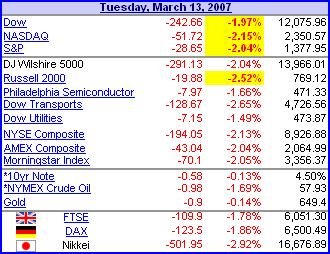 Traders now await the producer and consumer price indexes, scheduled to be release Thursday and Friday, respectively. The two inflation gauges should give investors a better idea of whether costs are escalating too fast, and if the Federal Reserve might give consumers some relief by lowering interest rates later in the year.
Traders now await the producer and consumer price indexes, scheduled to be release Thursday and Friday, respectively. The two inflation gauges should give investors a better idea of whether costs are escalating too fast, and if the Federal Reserve might give consumers some relief by lowering interest rates later in the year.
As a result, stocks in Japan, Hong Kong and Australia all fell more than 2 percent, while shares in Singapore, India, Malaysia and the Philippines tumbled at least 3 percent. The Shanghai Composite index was down 1.28 percent while in India, Bombay Stock Exchange, down by 397 points, or 3 percent, to 12,585.70 points in midday trading.
It is obvious the bear still rules the street. Any slight negative data or news will send a wave of sellers into the queue unloading stocks to limit their losses. No one can guarantee that the one-day drop will not continue for the next subsequent days ahead. Prior to China becoming the new economic giant, everyone looks at how U.S. stock market performs. But know the whole world depends on both China and U.S. Either one sneezes, you'll catch the cold.
So what should you do with such situation? It depends, really. If you’re trading option orinvesting stocks in U.S. stock market, then you’re pampered with choices. With bearish sentiment - you can sell-short, buy “Put”, activate your “Bear Call” Spread strategy and so on. But if you’re residing in Malaysia or Singapore where you can only profit from stock in one direction, you have no other choice but to wait, pray and hope (if you’re already in the market and making losses) or you can take the risk of entering now (with high percentage of getting slaughtered).
Other Articles That May Interest You ...
Ford Selling-Off James Bond's Aston Martin
David Richards, a former British racing champion together with American banker John Sinders and two Kuwaiti investment firms, Investment Dar and the Adeem Investment Company will become the new owner. Mr. Richards, whose racing and automotive technology company, Prodrive,
 helped develop Aston Martin’s racing program, became interested in buying the brand as soon as Ford put it up for sale.
helped develop Aston Martin’s racing program, became interested in buying the brand as soon as Ford put it up for sale.Mr. Richards will become Aston Martin’s chairman, while its current chief executive, Ulrich Bez, will continue to lead the company for at least five more years.
Officials at Ford, which is based in Dearborn, Mich., and is the second-largest American automaker behind General Motors Corporation (NYSE : GM, stock), insisted on Monday that they did not intend to sell other brands such as Jaguar or Land Rover, despite suggestions by many analysts to do so.
Ford closed out the worst year in its history two months ago, losing $12.7 billion amid slow sales of its biggest moneymakers, pickup trucks and sport utility vehicles. Ford stock price never traded above $10 a share in 2006. Ford should sign-up for a course to learn a thing or two from Toyota Motor Corporation (TYO: 7203) on how to produce quality cars without jeopardizing profit if it seriously want to turnaround the company which started by the father of automobile, Henry Ford.
Monday, March 12, 2007
AirAsia-X to Delay Long-Haul Flight to 2008
The reality was within reach when Jetstar, the budget
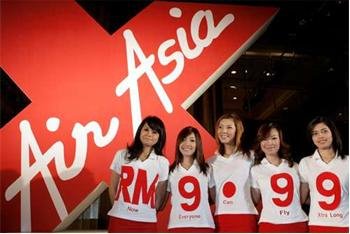 carrier of Australian carrier Qantas Airways Limited (ASX:QAN) said it plans to fly from Sydney to Kuala Lumpur from September 2007 onwards. In fact you still can check for seats availability and schedule here.
carrier of Australian carrier Qantas Airways Limited (ASX:QAN) said it plans to fly from Sydney to Kuala Lumpur from September 2007 onwards. In fact you still can check for seats availability and schedule here.Today, AFP reported a source from top company executive who said that AirAsia X, the long-haul budget airline set up by low-cost aviation pioneer Tony Fernandes, has delayed its takeoff, possibly until next year from the promised date of July 2007 (this year). The delay was said to be caused by higher leasing costs.
Besides, it was reported that AirAsia X has not decided on the type of aircraft and the firm does not want to get caught leasing planes at current high prices in a market with tight supply though Azmi, the CEO of Fly Asian Express (FAX), told AFP back in January 2007 that a decision will be made in Mar-2007.
Due to the delays in delivery of the Airbus super jumbo (the A380) to other carriers, it has led many airlines to acquire the A330 and caused excess demand. AirAsia X hopes to now start operations by year's end or at the latest, by August 2008. So if you’re still waiting and hoping to get a seat to fly to Britain for as low as 9.99 ringgit (2.97 dollars), then you’ve no other choice but to wait a little bit longer.
Other Articles That May Interest You ...
Sunday, March 11, 2007
Another Reason Why You Should Work With GOOGLE
As an employee of Google Inc. (Nasdaq: GOOG, stock) you’ll enjoy amongst others:
- unlimited amounts of free chef-prepared food at all times of day
- a climbing wall, a volleyball court and two-lap pools
- on-site car washes and oil changes
- haircuts and free doctor checkups
- stock-option
From the info gathered, this free ride is definitely a factor in attracting the best employees. Michael Gaiman, a 23-year-old Web applications engineer who lives in San Francisco and was recently hired, said he turned down an offer from Apple Inc (Nasdaq: AAPL, stock) before accepting the job at Google.
Inspired by Google, Yahoo Inc. (Nasdaq: YHOO,stock) also began a shuttle program in 2005 that could be described as the PepsiCo, Inc. (NYSE:PEP, stock) to Google’s Coke. eBay Inc. (Nasdaq:EBAY, stock) recently started began a pilot shuttle to five pickup spots in San Francisco and some high-tech employers are coming up with other approaches. Still, the top spot for Best Workplaces for Commuters went to Intel (Nasdaq: INTC, stock) which allows telecommuting, offers transit subsidies to employees and helps pay for shuttles that bring workers from transit stops, among other benefits. Microsoft Corp. (Nasdaq: MSFT, stock) came in second while Google and Oracle Corp (Nasdaq: ORCL, stock) both captured the third place.
Picking the Fruits of Valentine Investing - GUESS
Guess?, Inc. (NYSE: GES) which I highlighted almost a month ago (on Valentine day itself, to be exact) in “Will GUESS Defy Gravity And Continue 45 Degrees Uptrend?” did not only report earning which beat consensus, it also announced goodies in the form of 2-for-1 stock-split and a quarterly cash dividend of $0.12 a share. Such announcement will only steams the stock price upwards and this is exactly what happened.
 Guess?, Inc. reported fourth quarter earnings of $0.99 per share, $0.06 better than consensus, thanks to the globalization of the Guess? brand. Revenues rose 25.2% year over year to $346.4 mln versus consensus of $329.1 Million. It forecast earnings per share growth of up to 21% for the 2008 fiscal year. Operating margin in the fourth quarter improved 480 basis points to 20.5%, compared to the prior year's quarter. The company saw double-digit top line growth in each of its businesses, with Europe and licensing posting the largest increases.
Guess?, Inc. reported fourth quarter earnings of $0.99 per share, $0.06 better than consensus, thanks to the globalization of the Guess? brand. Revenues rose 25.2% year over year to $346.4 mln versus consensus of $329.1 Million. It forecast earnings per share growth of up to 21% for the 2008 fiscal year. Operating margin in the fourth quarter improved 480 basis points to 20.5%, compared to the prior year's quarter. The company saw double-digit top line growth in each of its businesses, with Europe and licensing posting the largest increases.
T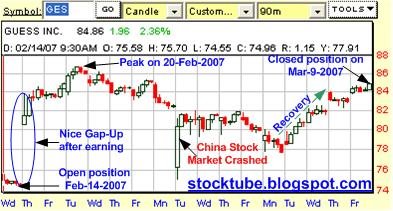 he stock price peaked on Feb-20-2007 before consolidates – a period which I should have close my position but my greed-friend told me to hang-on as the overall market sentiment was still bullish. The China stock market crash on Feb-27-2007 added salt to my wounds and should serve as a reminder that a day of holding a stock/option is an extra day of risk exposure. Fortunately the stock price recovered quite fast on the same day itself and should you have monitored the stock movement, you’ll know what I meant. It was a good experience for traders to test their emotions for the next subsequent days when the stock just refused to goes up again.
he stock price peaked on Feb-20-2007 before consolidates – a period which I should have close my position but my greed-friend told me to hang-on as the overall market sentiment was still bullish. The China stock market crash on Feb-27-2007 added salt to my wounds and should serve as a reminder that a day of holding a stock/option is an extra day of risk exposure. Fortunately the stock price recovered quite fast on the same day itself and should you have monitored the stock movement, you’ll know what I meant. It was a good experience for traders to test their emotions for the next subsequent days when the stock just refused to goes up again.
It’s true that whatever goes up must comes down and vice versa. Guess?, Inc. reversed and recovered thereafter and I took the opportunity to lock-in profit last Friday, Mar-9-2007. I’ve to close the position anyway because the additional shares from the split will be distributed on Monday, Mar-12-2007. And the profit I made for being greedy is only at 69% compare to more than 100% should I sell it somewhere at the peak. But you’ll never know. However, as long as your trade is profitable, you should be grateful and continue the journey of trading and investing.
Other Articles That May Interest You ...
EON Capital to Become A Takeover Target Now?
 Despite its’ highest offer, it lost (do you ever think EON Capital has any chance since the beginning anyway?) to not a better competitor but to a government-backed entity. Nowhere in the globe can you see a business company able to beat a government especially when politic and business exists within an area with such a grey area. You might not realize it but the money used by Malaysia’s state pension fund Employees Provident Fund (EPF) to force its’ body on the RHB belongs to the members who contributed to the fund. No doubt the clear winner is Utama Banking Group (KLSE:UBG, stock-code 6831) who walks away with billions of dollars to the bank.
Despite its’ highest offer, it lost (do you ever think EON Capital has any chance since the beginning anyway?) to not a better competitor but to a government-backed entity. Nowhere in the globe can you see a business company able to beat a government especially when politic and business exists within an area with such a grey area. You might not realize it but the money used by Malaysia’s state pension fund Employees Provident Fund (EPF) to force its’ body on the RHB belongs to the members who contributed to the fund. No doubt the clear winner is Utama Banking Group (KLSE:UBG, stock-code 6831) who walks away with billions of dollars to the bank.Now that EON Capital lost the bid, it better start thinking
 and preparing of a defensive plan since it might be a target of a takeover. Business Times thinks so when it quoted some analysts who think the seventh largest bank might become a M&A target. EON Capital’s values are its’ 130 EON Bank branches nationwide and its’ monopoly in car loans section especially the national cars controlled by Proton Holdings Bhd (KLSE: PROTON, stock-code : 5304).
and preparing of a defensive plan since it might be a target of a takeover. Business Times thinks so when it quoted some analysts who think the seventh largest bank might become a M&A target. EON Capital’s values are its’ 130 EON Bank branches nationwide and its’ monopoly in car loans section especially the national cars controlled by Proton Holdings Bhd (KLSE: PROTON, stock-code : 5304).It’s major shareholder, DRB-HICOM Berhad (KLSE: DRBHCOM, stock-code : 1619) is said to be eager to cash out and received the approval from Malaysia’s central bank, Bank Negara, recently to do so. DRB-HICOM which holds about 20% of EON Capital is in talks with US private equity firm Newbridge Capital. EPF also has indicated its’ interest to sell its’ 8.4 percent stake in EON Capital.
There’s also a possibility that EPF might use RHB Capital as the vehicle to reverse takeover EON Capital. And when that happens, it will be interested to see if there’re any other challengers who is big and powerful enough to give EPF a lesson (which I doubt so for obvious reason). With its’ clean-bill, EON Capital’s consolation would probably be the option of asking a higher price for its stake.
# TIP: With new speculation of EON Capital becoming a potential takeover, its' stock price will surely be chase-up. Investing on the stock might - just might return some decent profit for you.
Other Articles That May Interest You ...
Thursday, March 08, 2007
UBG Aye to EPF despite Higher Offer from EON Capital

UBG, whose owners have political connections to the ruling coalition, announced today, Mar-8-2007, that it had accepted a revised EPF offer of RM2.25 billion or 1.80 ringgit a share compared with the earlier RM2.2 billion for its 32.6% stake in RHB. EPF’s offer for RHB Capital is 4.80 ringgit per share.
The other two bidders are Kuwait Finance House (KFH) and EON Capital Berhad (KLSE: EONCAP, stock-code 5266). EON Capital’s latest offer was higher at 1.97 ringgit a share for RHB and 5.00 ringgit a share for RHB Capital. RHB stock price was last traded at 1.90 ringgit while RHB Capital stock price was at 4.76 before the trade suspension.
Though the pension fund didn’t specify which of the two bidders will ultimately manage RHB, a statement from KFH in congratulating EPF’s latest victory might indicates that the pension fund entered the battle-ring to help wrestle the crown for KFH.
Overall, the pension fund's offers value RHB group at 12.73 billion ringgit ($3.63 billion), while EON Capital's bids put it at 13.38 billion ringgit. Kuwait Finance House has not made a bid for the whole group but says it could invest up to $4 billion to turn its plans for RHB into reality.
Does this means the minority shareholders are not protected when UBG accepted the offers from EPF despite a higher offer from EON Capital? You bet, but due to the large block of stake EPF owns and the political link amongst the main players (EPF, UBG, Minister of Finance and central bank) in this game, you can’t do much, can you? EPF already mentioned that the bid was to protect and maximize return on its investment in RHB group. Read again, it’s not to protect minority shareholders but itself and only itself. By buying at the lowest price possible to control RHB, it has the option to sell to KFH at a higher price or let KFH pumps, runs and grows RHB to maximize profit at a later stage.
Other Articles That May Interest You ...
Tuesday, March 06, 2007
Which Group of Investors Bleeds The Most?
You can see the same similar statements shouted by former Malaysian Prime Minister Mahathir, Thailand prime minister, South Korea, Indonesia and so on during the
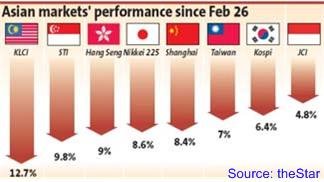 1997 Asia Economic Crisis. When the sentiment or the perception of majority investors are bearish the “fear” emotion rules and that’s when a falling-knife is about to happen. And no one wants to catch a falling-knife, do you?
1997 Asia Economic Crisis. When the sentiment or the perception of majority investors are bearish the “fear” emotion rules and that’s when a falling-knife is about to happen. And no one wants to catch a falling-knife, do you?These investors are deaf or do not care about your fundamental data no matter how loud you echo it. In fact the fund managers and analysts were the one who sell first thing when things do not goes as expected. They’ll follow instruction to cut-loss, while retail investors are still standing still “hoping”for miracle to turn the table around – which most of the time will never happen.
Today’s rebound can be categorized as “short-term technical rebound” after two weeks of bleeding (remember what goes up must comes down and vice versa?). Dozens will take the opportunity to tell you that the worst is over and you should start flocking back to the stock market. But should you? I’m not a risk-taker and I prefer to ride with the wave, so I’ll wait and see (you can curse if you wish to).
 Now, let’s goes back to the period when the Malaysia Prime Minister announced confidently said that Malaysia stock market will rally to 1,350 points – matching the 1993 Super Bull-Run. At that day, do you know that there’s a huge group of people who queues up signing up new stock-trading accounts? This group of people is the youngster, the teenagers who have no experience whatsoever in the world of stock-market.
Now, let’s goes back to the period when the Malaysia Prime Minister announced confidently said that Malaysia stock market will rally to 1,350 points – matching the 1993 Super Bull-Run. At that day, do you know that there’s a huge group of people who queues up signing up new stock-trading accounts? This group of people is the youngster, the teenagers who have no experience whatsoever in the world of stock-market.These young-chaps do not know what’s T+3 or the meaning of fundamental or technical analysis. And the rest is history. These beginners are the first and largest batch of investorswho fall prey to the cruelty of the stock market right after they entered into the fantasy world. And they didn’t know what hit them – they’ll still figuring out what happen to the huge losses and the reason they’re in the pool of blood, till now.
Back in 1993 Malaysia Super Bull-Run, the indicators or hints were when ordinary folks – the chicken sellers and vegetables resellers in bazaar were busy talking to their brokers via the brick-size cell-phone. This time it’s the youngsters. Will these people learn their lessons? Are you one of them? Share your comments or thoughts here.
# TIP: Remember when others are fear, you should be greed and while the crowds are greedy you should be very fearful.
Other Articles That May Interest You ...
Sunday, March 04, 2007
ASTRO Bullying Customers But Minister Is Helpless
At first I thought only high-rise residential viewers faced the problem
 of “Missing Channels”from their subscription with the famous “Service Is Not Available” greeting them during Astro’s migration of channels to the Measat-3 satellite. At least those were the reports I received. But the latest news reported says otherwise because residents staying in low ground faced the same problem. Worst they were slapped with RM50 fees to get a technician climbed onto the roof and adjusted the satellite dish’s direction.
of “Missing Channels”from their subscription with the famous “Service Is Not Available” greeting them during Astro’s migration of channels to the Measat-3 satellite. At least those were the reports I received. But the latest news reported says otherwise because residents staying in low ground faced the same problem. Worst they were slapped with RM50 fees to get a technician climbed onto the roof and adjusted the satellite dish’s direction.The Malaysian minister in charge (who is well-known and feared amongst journalists for his saliva gushing out in high-pressure manner that you’ll be sorry for not bringing umbrella) commented thatAstro is wrong to charge its customers to rectify reception problems resulting from its migration to the Measat-3 satellite and advised customers who had been charged to write to the Malaysian Communications and Multimedia Commission (MCMC).
Check Traffic Before Start Your Journey

If you’re staying in U.S. Google offers the facility for more than 30 major cities. You can now see up-to-date traffic conditions to help you plan your schedule and route. For example if you're in San Francisco, New York, Chicago, Dallas, you just need to click on “Traffic” button to show current traffic speeds directly on the map. The map will shows some route with different color indicators:
- Red route means stop-and-go traffic
- Yellow route means expect a slight delay on your appointment
- Green route means you’re in luck because it’s a smooth sailing
# TIP: To view the traffic click link here to view San Francisco, New York, Chicago orDallas
Other Articles That May Interest You ...
Saturday, March 03, 2007
Genting Intl Lost Poker Game - Pull Out From Macau Deal
I
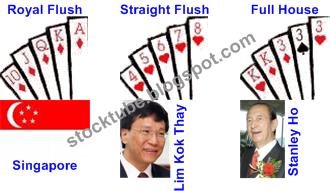 n a latest statement to Singapore Exchange,Genting International(SIN: G13) said it was divesting its stake in a Macau hotel casino to be run by Ho "as soon as practicable" because it was unlikely to meet the deal's regulatory deadline of March 19.
n a latest statement to Singapore Exchange,Genting International(SIN: G13) said it was divesting its stake in a Macau hotel casino to be run by Ho "as soon as practicable" because it was unlikely to meet the deal's regulatory deadline of March 19.Earlier, Singapore's casino regulator said that Genting International and Star Cruises along with their business associates would be subject to "suitability checks" before they would be awarded a casino license in the first salvo in punishing Genting for forming a partnership with Stanley Ho secretly without consulting Singapore authorities.
Genting's Macau investment is part of a deal announced in January that gave a group of investors including Ho a 5.99 percent stake in Star Cruises, which has a 25 percent stake in the Singapore project.
Genting Group should knows from the beginning its’ cards are such that it has to comply with the Singapore authorities since the government hold the five cards of a “Royal Flush” while Genting only managed to secure a “Straight Flush”. Stanley has to call it quit since he only managed a “Full House”. Logically one has to follows where the potential of making money is the highest – in this case Singapore, where the casino business is open for the first time in the history of the nation.
However the story might just begun as it is yet to be seen if the Singapore authorities are satisfy with Genting’s latest arrangement. Singapore might be able to smile at junior Lim only if both Genting International and Star Cruises hand-off from any Stanley-Macau deal as Stanley might still be entering Singapore project via its’ 5.99 percent stake in Star Cruises. But if Stanley is not allowed any stake then there’s no reason why Star Cruises will be allowed into Macau, which will translate the whole scenario back to square one. Genting stock price should be revised down minus it’s valuation of Macau’s project.
Other Articles That May Interest You ...
Friday, March 02, 2007
Insider Trading Exposed - What's The Big Deal?
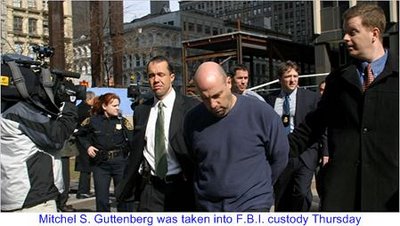 Linda C. Thomsen, chief of enforcement at the SEC, described the scheme as one of the most “pervasive Wall Street insider trading rings since the days of Ivan Boesky and Dennis Levine.”
Linda C. Thomsen, chief of enforcement at the SEC, described the scheme as one of the most “pervasive Wall Street insider trading rings since the days of Ivan Boesky and Dennis Levine.”
The Accused: 13 (thirteen) people including a former Morgan Stanley (NYSE: MS, stock) compliance official, a senior UBS AG (NYSE: UBS, stock) research executive, three employees of Bear Stearns Companies Inc. (NYSE: BSC, stock) and an employee from Bank of America Corp (NYSE: BAC, stock).
The Tactic: Wall Street executives tipping hedge fund traders about potential upgrades or downgrades of stocks, information which almost will move a stock’s price; leaking information about pending mergers and acquisitions, and taking kickbacks to get access to hot deals.
How it started: In 2001, Mitchel S. Guttenberg, a 41-year-old executive director in the stock research department of UBS, met a friend, Erik R. Franklin, then a hedge fund manager at Bear Stearns at the Oyster Bar. Mr. Guttenberg owed Mr. Franklin $25,000 and proposed paying that debt with information about stock upgrades and downgrades. He was a member of the firm’s investment review committee, which reviewed and approved analyst recommendations.
How much did some of them made:
- Mr. Franklin made $5 million over 5 years – pleaded guilty
- David Tavdy, a 38-year-old proprietary trader at Andover Brokerage made $6 million from Mr. Guttenberg’s tips – pleaded not guilty
- Two executives at Assent who got wind of the illegal UBS info & trading demanded bribes of $150,000 to stay quiet.
- Marc Jurman, Randi Collotta and Christopher Collotta netted $600,000. Jurman pleaded guilty but the Collotas pleaded not guilty.
Randi Collotta, a 30-year-old lawyer in the global compliance department at Morgan Stanley, teamed up with her husband, Christopher Collotta, to dispense information about Morgan Stanley’s coming mergers to Marc Jurman (a high school friend). Jurman traded on deals involving Adobe System Inc. (NASDAQ: ADBE, stock) acquisition ofMacromedia in 2005 and ProLogis’s (NYSE: PLD, stock) acquisition of Catellus Development.
Mr. Guttenberg provided hundreds of tips to Mr. Franklin about rating changes so that he could make quick trades in his hedge fund at Bear Stearns, Lyford Cay Capital. The two agreed to share the after-tax profits after the debt between them was settled. They exchanged cash at arranged meeting places. Lyford Cay was a small hedge fund overseen by Kurt W. Butenhoff, a senior managing director at Bear Stearns who is a top-producing broker and an equity derivatives specialist.
Mr. Franklin who used to report to Mr. Butenhoff left Lyford Cay in 2002 to return to Chelsey Capital and together with another portfolio manager traded on UBS tips. Mr. Guttenberg pleaded not guilty yesterday while Mr. Franklin pleaded guilty. For two counts of conspiracy to commit fraud and four counts of securities fraud, Mr. Franklin would face a maximum of 90 years in prison, but sentencing guidelines suggest he would more likely face about five years.
The fact is insider trading occurs almost in every country's financial market. Either these people are smart enough not to get caught or the law just couldn’t goes near them or the government doesn’t really care about this issue. Some of you may laugh your heart out reading the small figures involved in this insider trading. Some countries (need I say which it is?) consider this reported insider trading as a chicken-feed compare to the illegal “open” trading yet untouchable (to prosecution) that occurs almost on daily basis. So, what's the big deal?
Warren Buffet Is Hiring - Young CIO
 Chinese proverb in relationship to how long a business empire built will lasts.
Chinese proverb in relationship to how long a business empire built will lasts.Westerners meanwhile learnt that there’s nothing wrong to pass on your business empire to people other than your immediate family members as capability of a person supersedes every factors if you wish to see your built-empire survives through decades or even centuries of challenges. That’s why you still can see Ford Motor (NYSE: F, stock), Coca-Cola Company (NYSE:KO, stock) and Alcoa Inc. (NYSE: AA, stock) around.
Legendary investor Warren Buffett is the greatest investor of all. Almost all investors investing in stocks would know who this great Oracle is. If you do not know who he is, you shouldn’t start investing your hard-earned money yet. He is so famous that his flagship, Berkshire Hathaway Inc. (NYSE: BRK-A) actually commands a huge premium on the stock price. Should he dies today, the stock of Berkshire Hathaway Inc. will tumble like a rock – most analysts believe. As he approached the age of 70 (Warren is 76 now), everyone was started to ask the billion-dollar question – who will be his successor? His sons neither have the magical touch nor half the investing talent he has.
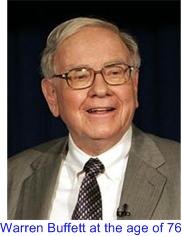 Known as the Oracle of Omaha, Buffett has transformed Berkshire since 1965 from a failing textile company into a $164 billion conglomerate by buying out-of-favor companies with strong management and businesses, and investing in stocks.
Known as the Oracle of Omaha, Buffett has transformed Berkshire since 1965 from a failing textile company into a $164 billion conglomerate by buying out-of-favor companies with strong management and businesses, and investing in stocks.Yesterday, Mar-1-2007, in his annual shareholder letter Warren reveals his intention to hire a young investment manager to succeed him. Berkshire will create two top positions – chief executive officer (CEO) and chief investment officer (CIO). It was hope that the new candidate for the CIO position will be having some mandatory requirements besides being young.
Last year Buffett said Berkshire's board had three outstanding internal candidates for chief executive, and the board knows "who should take over if I should die tonight." Each of those candidates is significantly younger then the 76-year-old Buffett.
This year, the "Oracle of Omaha" said Berkshire is not well-prepared for a successor on the investment side of the business because those who might replace him on the investment side are too close to his own age. The best candidate so far for is Lou Simpson who manages Geico’s investment portfolio but Lou is already 70.
Some of the criteria the young CIO should possess include:
- have impressive investment records
- able to think independently
- recognize and avoid serious risks
- emotional stable
- keen understanding of human and institutional behavior
- able to put $38.3 billion cash to work
- as young as possible in relative to Warren’s age of 76
 During the fourth quarter, which ended Dec. 31, Berkshire made $3.58 billion, or $2,323 per share. That is down 30.2 percent from the year-ago period when Berkshire made $5.13 billion, or $3,330 per share.Berkshire's Class A shares (BRK.A) arethe most expensive U.S. stock, and they have traded above $100,000 a share since last fall. Berkshire's Class A shares ended Thursday up $410 at $106,600 and its Class B shares (BRK.B) rose $31 to $3,554.
During the fourth quarter, which ended Dec. 31, Berkshire made $3.58 billion, or $2,323 per share. That is down 30.2 percent from the year-ago period when Berkshire made $5.13 billion, or $3,330 per share.Berkshire's Class A shares (BRK.A) arethe most expensive U.S. stock, and they have traded above $100,000 a share since last fall. Berkshire's Class A shares ended Thursday up $410 at $106,600 and its Class B shares (BRK.B) rose $31 to $3,554.
Buffett said Berkshire gained $16.9 billion in net worth during 2006, which represents an 18.4 percent jump in the per-share book value of the company. That's better than the S&P 500's 15.8 percent increase in value during 2006.
 Berkshire owns more than 60 companies, including insurance, clothing, furniture, jewelry and candy companies, restaurants, natural gas and corporate jet firms and has major investments in such companies asCoca-Cola Co. (Warren’s favorite drink), Anheuser-Busch Companies Inc. (NYSE: BUD, stock), American Express Co (NYSE:AXP, stock), Dairy Queen ice cream, Fruit of the Loom underwear and Wells Fargo & Co(NYSE: WFC, stock).
Berkshire owns more than 60 companies, including insurance, clothing, furniture, jewelry and candy companies, restaurants, natural gas and corporate jet firms and has major investments in such companies asCoca-Cola Co. (Warren’s favorite drink), Anheuser-Busch Companies Inc. (NYSE: BUD, stock), American Express Co (NYSE:AXP, stock), Dairy Queen ice cream, Fruit of the Loom underwear and Wells Fargo & Co(NYSE: WFC, stock).
Other Articles That May Interest You ...
Thursday, March 01, 2007
Aladdin's Flying Into Malaysia - Helping MAS's debt problem
The MAS Hotels & Boutiques Sdn Bhd sale (MHB), which includes the Four Seasons Hotel in Malaysia, comes as
 the state-controlled Malaysia Airlines unloads non-core assets to help turn around the once-ailing airline. The carrier said it stood to gain 62 million ringgit from the sale, which is expected to be completed by the end of the third quarter, will translate into an improved earnings per share (EPS) of five sen.
the state-controlled Malaysia Airlines unloads non-core assets to help turn around the once-ailing airline. The carrier said it stood to gain 62 million ringgit from the sale, which is expected to be completed by the end of the third quarter, will translate into an improved earnings per share (EPS) of five sen.Alwaleed, the nephew of King Fahd, is one of the largest single foreign investors in the United States. His major holdings include interests in U.S. tech heavyweight Apple Inc.’s (Nasdaq:AAPL, stock) and media giant Time Warner Inc. (NYSE: TWX,stock). He owns almost 5 percent of Citigroup (NYSE: C, stock), the largest U.S. bank, and more than 5 percent of the U.S.-based media conglomerate News Corporation (NYSE: NWS, stock).
Last year Alwaleed and Colony Capital agreed to pay $3.9 billion for Canada's Fairmont Hotels & Resorts Inc (FHR.TO), trumping an offer by billionaire investor Carl Icahn. It seems Middle-East tycoons are seriously flexing their muscles investing into Asian region. With their huge war-chest, this could be the beginning of the Aladdin's invasion to shield themselves should one day their oil-fields run-dry. What about Malaysia - are they still in complacent mood?
Wednesday, February 28, 2007
China Sneezes, U.S. Catches Cold and Others Panic

The global rout was triggered by the biggest sell-off in the Chinese stock market for 10 years. The main Shanghai exchange fell 8.8pc, its worst fall since the death of premier Deng Xiaoping in 1997. The trouble began Tuesday - just one day after Chinese stocks hit a record - as investors unloaded shares to lock in profits amid speculation about a fresh round of austerity measures from Beijing to slow the nation's sizzling economy.
This followed by Wall Street when the Dow fell 546.20, or 4.3 percent, to 12,086.06 before recovering some ground in the last hour of trading to close down
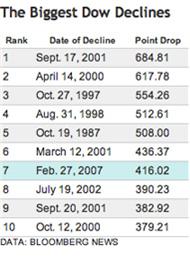 416.02, or 3.29 percent, at 12,216.24. It was the Dow's worst point decline since Sept. 17, 2001, the first trading day after the terror attacks, when the blue chips fell 684.81, or 7.13 percent. The drop hit every sector across the market, and a total of $632 billion was lost in total in U.S. stocks on Tuesday.
416.02, or 3.29 percent, at 12,216.24. It was the Dow's worst point decline since Sept. 17, 2001, the first trading day after the terror attacks, when the blue chips fell 684.81, or 7.13 percent. The drop hit every sector across the market, and a total of $632 billion was lost in total in U.S. stocks on Tuesday.A Commerce Department report that orders for durable goods in January dropped by the largest amount in three months exacerbated jitters about the direction of the U.S. economy. Investors were also spooked by comments Monday from former U.S. Federal Reserve Chairman Alan Greenspan, who said a recession in the U.S. was "possible" later this year. In percentage terms however, the losses on Wall Street were nowhere near the record 24 percent loss in 1914 and the more recent 1987 collapse of 22.6 percent for the benchmark Dow index.
Investor optimism took a tumble in February falling back to
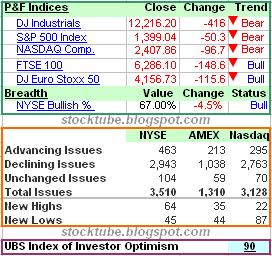 the level it reached in December 2006. The Index dropped 13 points to 90 (refer to chart), erasing all of its gains from January and bringing it back below 100, where it has generally been since December 2000. The Index is conducted monthly and had a baseline score of 124 when it was established in October 1996.
the level it reached in December 2006. The Index dropped 13 points to 90 (refer to chart), erasing all of its gains from January and bringing it back below 100, where it has generally been since December 2000. The Index is conducted monthly and had a baseline score of 124 when it was established in October 1996.So I guess it’s true that China is the emerging new economic power of the world. Previously when U.S. sneezes, the rest of the world catches the cold. Now it’s time the China sneezes and you can see the effect. But China factor is only part of the reason. The global stocks/equity markets have been on uptrend and this China stocks’ plunge was taken as an excuse for investors to take profit and run for shelter. How long will the bear play with the stock market is everyone’s guess. It could be days or weeks before the sky is clear for investors to decide the next direction.
# TIP: For those with lion-heart, a panic-selling day is an opportunity to scalp the stock for a minor but fast profit. Panic sellers will dump at any price because the FEAR rules the day.
Other Articles That May Interest You ...
Singapore Set To Punish - Will Genting Get Casino License?
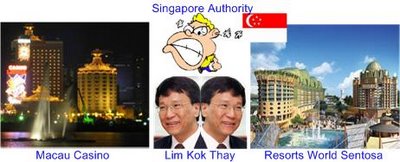
Singapore said it has not yet awarded a casino license to Genting Berhad, even though the Malaysian gaming group won a tender in December. On Thursday, Genting is due to sign an agreement with Sentosa Development Corp., a government-owned body which runs the resort island where the casino will be built.
"The signing of the development agreement and the issuance of a casino license are two separate matters … The signing of the development agreement allow Genting International and Star Cruises to proceed with the construction of the integrated resort. However, it does not automatically qualify them for the casino license, which is needed before it can operate the future casino," Singapore's Ministry of Home Affairs casino regulator said in an emailed statement today, 27-Feb-2007.
Analysts said the deal between Genting and Stanley Ho has clearly upset the Singapore authorities, prompting the regulator to warn today that it may withhold the license for the casino, potentially the most lucrative component of the entire resort. The casino regulator said in a statement that Genting's eligibility for a casino license would depend on its suitability as specified in a key clause in Singapore's casino act. That clause states that operators must not have any business association with any partner who "is not of good repute having regard to character, honesty and integrity or has undesirable or unsatisfactory financial resources."
The statement is obviously targeting at Stanley Ho’s unproven but known connection to Macau’s reputation for massage parlours and triad gangs together with money laundering. I think Genting needs to sever the connection between Genting and Stanley Ho if it really treasures the Sentosa project that it won. With this negative news together with Dow Jones which shed 120 points at this moment, expect Genting related stocks to take a beating tomorrow when the market opens.
Other Articles That May Interest You ...
Tuesday, February 27, 2007
Malaysian Stock Market Crashing - More To Come?
Ignore the political calls and cries asking you as a retail investor to support by participating in Malaysian stock market. Ask Citigroup (NYSE: C, stock) Equity Research to
 fly kite as well since this research firm always give contrarian suggestion to investors for obvious reason – they want to sell badly after accumulated stocks at lower price. To me, both the political figures and the market makers above belongs to the same group – they’re the fox guarding the chicken coop and asking the little chickens (that’s you and me dude) to queue up entering the slaughtering chambers.
fly kite as well since this research firm always give contrarian suggestion to investors for obvious reason – they want to sell badly after accumulated stocks at lower price. To me, both the political figures and the market makers above belongs to the same group – they’re the fox guarding the chicken coop and asking the little chickens (that’s you and me dude) to queue up entering the slaughtering chambers.And today what do you get with Malaysian stock market a.k.a. Bursa Malaysia (KLSE: BURSA, stock-code 1818)? A 50 points or almost 4% drop (minutes before closing just now) with arecord 1151 stocks down comprises 87% of the total stocks listed on the Kuala Lumpur Stock Exchange. Maybe the government should shout and front-page this record-breaking stock-crash the way they shouted how the good times were back not long ago.
 Why am I so happy with the stocks-crash? I’m not, but I’ve to admit I’m glad I listened to my inner voice and my experience gained throughout the years of investing that something is not right about the sudden rush of the goodies. The simplest thing I learned is you have to take contrarian stand with a country’s equity market where the government does not practice transparency. So when the government officials say “you should buy”, you better take the opposite action and “sell instead”. Since when you make money because the government sincerely cares for you that they tipped you to enter the stock market in Malaysia?
Why am I so happy with the stocks-crash? I’m not, but I’ve to admit I’m glad I listened to my inner voice and my experience gained throughout the years of investing that something is not right about the sudden rush of the goodies. The simplest thing I learned is you have to take contrarian stand with a country’s equity market where the government does not practice transparency. So when the government officials say “you should buy”, you better take the opposite action and “sell instead”. Since when you make money because the government sincerely cares for you that they tipped you to enter the stock market in Malaysia?You have to remember that EPF (Employees Provident Fund) or PNB (Permodalan Nasional Berhad) or other government-linked agencies need to make money the way you want to in the stock-market. Need I tell you how much money the government needs to organize, conduct and vote-fishing in a general election? Where do you think those mountains of money came from?
Of course the analysts justify the bungee-jump stock performance on Dow-Jones consecutive days of down-trend, overdue correction, profit-taking, oil prices above $61 a barrel, geopolitical factors and other excuses which never fail to amuse me. But I bet they’ll never tell you if the foreign investors are pulling out in a big way. It’s possible the foreign investors who flooded into stock-market recently are short-term investors or speculators. Looking at the trend, it is impressive the retail investors nowadays are deploying a smarter strategy – investing in short-term by day-trading. If indeed the top-volume were played by retails, you can see them run helter-skelter today upon seeing the fox coming.
And did you notice how most of the 20 top-volumes stocks register double-digit percentage of drop? After the closing, the composite index was down 35 points – isn’t it fantastic how the “investors” push-up the index by 15 points within the few last minutes? Of course it's too early to tell if today's drop is an early indicator of the stock market crash. Ready for stock short-sell?
Other Articles That May Interest You ...
CAT & ESRX - Over 100% Profits In Option Trading
 About a month ago on 26-Jan-2007 (yes, this trade is about a month old), Caterpillar reportshighest ever fourth quarter and full-year sales and profit of $41.517 billion in sales and profit of $3.537 billion, or $5.17 per share for financial year 2006. The company also reported a recordfourth quarter with sales and revenues of $11.003 billion and profit of $882 million, or $1.32 per share, up 10 percent from last year.
About a month ago on 26-Jan-2007 (yes, this trade is about a month old), Caterpillar reportshighest ever fourth quarter and full-year sales and profit of $41.517 billion in sales and profit of $3.537 billion, or $5.17 per share for financial year 2006. The company also reported a recordfourth quarter with sales and revenues of $11.003 billion and profit of $882 million, or $1.32 per share, up 10 percent from last year.
 In 2007, the company expects anotherrecord yearwith sales and revenues in a range of $41.5 to $43.6 billion, which is flat to up 5 percent from 2006, and profit in a range of $5.20 to $5.70 per share. "I'm anticipating great things for Caterpillar in 2007. Despite a sharp decline in two key North American industries - on-highway truck engines and U.S. housing - and an expected reduction in dealer inventories, we are projecting another record year in 2007 … We expect to improve profit per share at a higher rate than sales and revenues, and that means a key focus in 2007 will be cost management." said Chairman and Chief Executive Officer Jim Owens.
In 2007, the company expects anotherrecord yearwith sales and revenues in a range of $41.5 to $43.6 billion, which is flat to up 5 percent from 2006, and profit in a range of $5.20 to $5.70 per share. "I'm anticipating great things for Caterpillar in 2007. Despite a sharp decline in two key North American industries - on-highway truck engines and U.S. housing - and an expected reduction in dealer inventories, we are projecting another record year in 2007 … We expect to improve profit per share at a higher rate than sales and revenues, and that means a key focus in 2007 will be cost management." said Chairman and Chief Executive Officer Jim Owens.
That’s all it needs to give Caterpillar the steroid to keep pushing the stock price up from the moment of the gap-up. From the chart, you can see it did paused for a while to establish a support level above $64 before continue its’ assault. Yesterday I sensed that Caterpillar could be trying to build another higher support level of $67 but I guess the sense of not wanting to be a pig (remember the phrase “Bull & Bear make money but Pig get slaughtered?") prompted me to erase this position from my monitoring screen and take money off the table altogether. Furthermore it’s over140% profits on my May 60 Call option position trading this lovely Caterpillar and I should be glad of it.
Express Scripts, Inc. (Nasdaq: ESRX, stock)  which launched the takeover bid forCaremark Rx, Inc. (NYSE: CMX,stock) in December 2006, posted earnings of $147.2 million, or $1.07 per share, compared with a profit of $111.1 million, 75 cents per share, during the same period a year earlier. Revenue however fell 1 percent to $4.53 billion from $4.58 billion. Express Scripts beat earning consensus of 97 cents per share on revenue of $4.6 billion polled by Thomson Financial.
which launched the takeover bid forCaremark Rx, Inc. (NYSE: CMX,stock) in December 2006, posted earnings of $147.2 million, or $1.07 per share, compared with a profit of $111.1 million, 75 cents per share, during the same period a year earlier. Revenue however fell 1 percent to $4.53 billion from $4.58 billion. Express Scripts beat earning consensus of 97 cents per share on revenue of $4.6 billion polled by Thomson Financial.
The main bullet was the upside profit guidance issued with new target between $4.08 and $4.20 per share from between $3.90 and $4.02 per share. Express Scripts said the guidance does not include any potential impact from a successful takeover of Caremark.
Upon earning announcement, the stock price of Express Scripts gapped-up but could not sustain the momentum thereafter and took a lazy rest. However the stock rises and performs what I hope for – an uptrend, more of 30 degrees. The uptrend somehow stopped last week below stock price of $78 but has since traded above this level. But it’s not moving upwards anymore, instead the stock try to build a support level at $78 but I’m not sure if this level can be maintained. My disadvantage on this Mar 70 Call option trade is I’m losing the time-value. So I decided to lock-in profit with over 100% profits. With both options, Caterpillar and Express Scripts, over 100% profits what else can I complaint?
# TIP: Depending on your risk management, holding on to stocks or option after a good earning announcement could sometime provide higher profits - require constant monitoring.
Other Articles That May Interest You ...
Monday, February 26, 2007
Factors From 1997 Asia Crisis Re-Appears - A Bad Sign?
The region had seen a sharp rise in hedge fund activity and credit finance capital inflows into Asian equity and financial 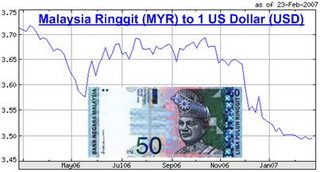 products. Asian-Pacific equity markets rose 29 percent in 2006. In 2007, so far Malaysia is the best equity market performer. Speculative inflows and a weak U.S. dollar pushed most regional currencies higher last year prompting the Bank of Thailand imposed tough capital controls in December to control surging baht. The control however backfired and triggered massive stocks sell-off by frustrated foreign investors.
products. Asian-Pacific equity markets rose 29 percent in 2006. In 2007, so far Malaysia is the best equity market performer. Speculative inflows and a weak U.S. dollar pushed most regional currencies higher last year prompting the Bank of Thailand imposed tough capital controls in December to control surging baht. The control however backfired and triggered massive stocks sell-off by frustrated foreign investors.
Despite the lessons learned during the 1997 crisis, some banks are still being pressured to lend to politically-connected individuals or companies. So, could the sudden interest of foreign investors into Malaysia Stock Exchange originated from speculators? If it’s true then what will happen if these speculators pull-out suddenly from the stock market to realize profit? At the same time these speculators could be shorting Malaysia ringgit before pulling-out to make double profit – stocks & currency trading. Malaysia ringgit might not be the same as in 1997 because off-shore currency trading is still not allowed giving the benefits of central banking monitoring and intervention.
However in a systematic speculators selling across the board within Asian countries, the domino effect might still be 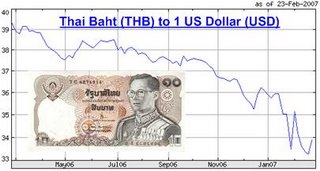 strong enough to send a wave of destruction to the economy of the country.Could this be the reason the banking in Malaysia saw numerous stakes selling to foreigners – to reduce debts and prepare for the ultimate? Malaysia central bank has on numerous occasions assures the public and investors that the appreciation of Malaysia ringgit does not trigger any alarm yet and the authority is still comfortable with the current situation but even if there’s a situation that warrant attention, you don’t expect them to tell you the truth, do you?
strong enough to send a wave of destruction to the economy of the country.Could this be the reason the banking in Malaysia saw numerous stakes selling to foreigners – to reduce debts and prepare for the ultimate? Malaysia central bank has on numerous occasions assures the public and investors that the appreciation of Malaysia ringgit does not trigger any alarm yet and the authority is still comfortable with the current situation but even if there’s a situation that warrant attention, you don’t expect them to tell you the truth, do you?
Of course the weird statement was the numerous reminders from Stock Exchange top officials trying to convince retail investors the bull is real. Why the authority is so concern as if they care for you and me? Suddenly Malaysia government becomes a public-caring government and badly wants you to believe the economy is at its’ best of health.
Citigroup (NYSE: C, stock) Equity Research today was generous enough to tips you that all signs on the stock market are tracing similar lines to the 1992/1993 bull run. Since when do you heard of a fund tells you “let’s start investing now and make profit together?” Remember the rule of “buy low sell high”? Well, when the market makers have done with their “Buy Low” they need buyers to buy from them so that they can “Sell High”. They need to tell the public it’s time for you to enter the market so that the un-informed suckers out there will “sell high and buy low”.
Other Articles That May Interest You ...
IDR-Nusajaya – Another White Elephant Dooms to Failure?
 So when he finally announced his own created project a.k.a.Iskandar Development Region (IDR) which has Nusajaya as a key component, the news was taken with mixed-reaction. The IDR would be the biggest development cluster in South-East Asia – it was claimed. Nusajaya covers 9,712ha and would be developed over five decades. Earlier, Badawi has been trying unsuccessful in attracting Mickey Mouse and the fantasyland to Nusajaya. Two main factors formed the main obstacles – humid weather and the country’s ruling party’s to-be “Islamic Champion”. You do not wish to walk miles under such weather condition only to be able to take photograph of Mickey Mouse wearing black scarf from head to toe, do you?
So when he finally announced his own created project a.k.a.Iskandar Development Region (IDR) which has Nusajaya as a key component, the news was taken with mixed-reaction. The IDR would be the biggest development cluster in South-East Asia – it was claimed. Nusajaya covers 9,712ha and would be developed over five decades. Earlier, Badawi has been trying unsuccessful in attracting Mickey Mouse and the fantasyland to Nusajaya. Two main factors formed the main obstacles – humid weather and the country’s ruling party’s to-be “Islamic Champion”. You do not wish to walk miles under such weather condition only to be able to take photograph of Mickey Mouse wearing black scarf from head to toe, do you?
To add more spices to the project, Badawi hand-picked some individuals to give an impression it garners the support of the world. The most prominent figure is non-other than multi-billionaireRobert Kuok, Malaysia’s richest man. Others are Andrew Sheng (Former chairman of the Hong Kong Securities and Futures Commission), Tun Musa Hitam (former deputy prime minister who served under Mahathir Mohamad), Kishu Tirathrai (a Malaysian businessman known for his textile business) and Samsudin Osman (former chief secretary to the government and chairman of the Employees Provident Fund).
Unless Robert Kuok is willing to pour half his fortune into this new first pet project of Badawi, I won’t blink twice thinking about the success rate of it. As comparison, Mahathir started the MSC (Multimedia Super Corridor) to leapfrog Malaysia into the information and knowledge age when Singapore was nowhere in sight to give a challenge. MSC started with a huge optimism of success only to ends with nothing more than an empty vessel with infrastructure minus the intellectual. It fails to the extent that Mahathir had to beg Bill Gates from Microsoft Corp. (Nasdaq: MSFT, stock) to invest and be part of IAP (International Advisory Panel) to give it some gases to move on. Today, MSC is nothing more than an area known for its’ support center to foreign major tech companies taking advantage of the incentives and good but cheap I.T. workers.
Again, Malaysian were being presented with a new project with potential in tourism, a financial centre, housing, medical facilities and education in an area the size of 2.5 times of Singapore which is able to compete with Dubai, Shenzhen, Hong Kong and Bangalore. You’re being promised a 20-year plan attracting 105 billion dollars. Badawi was right when he said the new project has to be competitive to draw investors but to be in the league with Dubai or Hong Kong, the prime minister has to solve the problem of transparency, corruption and crime together with abolishment of the never-ending New Economic Policy without which will only bring the cost of doing business sky-rocket and the lack of brain-talents.
I do believe the government is able to build whatever world-class infrastructure for this project as proven again and again by all the previous mega-projects. But to convince foreign investors that this is new Hong Kong in the making, the prime minister needs to do more than drumming his new pet-project with empty speeches on the front-page of newspaper on daily basis. I begin to see a yet another white-elephant being drafted on white-paper. Furthermore Robert Kuok has yet to spend a penny on this IDR-Nusajaya and excatly what values do other advisors are suppose to bring in?
Nevertheless there’re some winners in this project such as UEM World Berhad (KLSE:UEMWRLD, stock-code 1775) a construction firm linked to ruling UMNO party, which owns hundreds of thousands of hectares of lands within the project boundary and saw its’ stock price rises ever since. Other closely linked speculators also benefits from the run-up on the stock priceof the company.
# TIP: It won't do any harm if you promise BIG and very LONG-TERM project as you would be long gone before people can see the result of such project. Even if it fails, it'll be your successors' failure and not yours.
Thursday, February 22, 2007
Bank of Tokyo Helps Reduce Bumiputra-Commerce Debts
 Now the news is out that Japan's Bank of Tokyo-Mitsubishi UFJ (BTMU) (TYO:8306) agreed to invest $382 million (RM 1.335 billion) in Malaysian banking group Bumiputra-Commerce Holdings Bhd via the subscription of 117 million new BCHB shares priced atRM11.41 per share, a 17% premium above BCHB's closing price on Feb 21 of RM9.75. This will raised BTMU stake in BCHB from 1.1% to 4.5%.
Now the news is out that Japan's Bank of Tokyo-Mitsubishi UFJ (BTMU) (TYO:8306) agreed to invest $382 million (RM 1.335 billion) in Malaysian banking group Bumiputra-Commerce Holdings Bhd via the subscription of 117 million new BCHB shares priced atRM11.41 per share, a 17% premium above BCHB's closing price on Feb 21 of RM9.75. This will raised BTMU stake in BCHB from 1.1% to 4.5%.
 Bumiputra-Commerce, part owned by the Malaysian government and the brother of Malaysian deputy prime minister, aims to become a regional Southeast Asian bank. It already controls Indonesia’s Bank Niaga PT (JAK: BNGA) and also the broking arm of Singapore investment firm GK Goh. It created the much sensation business news when in 2006 it launched a hostile take-over of a smaller but profitable Chinese-basedSouthern Bank for $1.81 billion.
Bumiputra-Commerce, part owned by the Malaysian government and the brother of Malaysian deputy prime minister, aims to become a regional Southeast Asian bank. It already controls Indonesia’s Bank Niaga PT (JAK: BNGA) and also the broking arm of Singapore investment firm GK Goh. It created the much sensation business news when in 2006 it launched a hostile take-over of a smaller but profitable Chinese-basedSouthern Bank for $1.81 billion.
Do you understand now why every Tom, Dick & Harry wants to squeeze into Malaysian’s politics so badly? It’s the ticket to money-printing machine if you’re someone up the ladder of the power-chain. What you need are some lucks, the right connection and park at the right parking lot. It’ll be jackpot if you’re borne into the family of existing powerful politicians. In this case, you just need to take over (who cares if you do forcefully?) a well-managed and profitable bank to create a supermarket financial institution. Your close-political connection will silence all the critics. You don’t have to worry about financial capability because all the other banks will queue-up to offer all the money you need to finance the acquisition. Push up the price of your stocks to make it expensive and offer certain stakes to foreign partners of which the money can be used to offset the initial acquisition.
Do you still think making money is that damn difficult? Think again. Along the journey if you get bored playing with banking business and wish to diversify to other toys, just sell it. Banking license is a commodity which can fetch a high premium in Malaysia. Comes another round of 1997 Economic Crisis, you’ll still escape unscratched as the government wills definitely bails you out. Check out the price the Malaysian government was willing to pay Tajuddin Ramli to acquire back Malaysian Airline System (KLSE: MAS, stock-code 3786) shares. The worst that can happen to your investment is “Breakeven”. You’re guaranteed no prosecution or jail sentence even when the lady luck is not with you that you’re finally broke. Who cares about minority shareholder’s interest?Get real, this is Malaysia, a land where politic dictate the direction of how the businesses are to be run.
Wednesday, February 21, 2007
Malaysian Government Badly Wants You To Believe Them
There’re equal numbers of professional analysts who felt the same – that current economic situation is not that rosy as claimed and the stock market is not as bullish as what retail investors are hoping for, mainly due to the fact that only index-linked stocks were being pushed up.
Last week, Feb-18-2007, probably sensing that retail investors who formed the majority of the voters are not taking the bait the deputy premier Najib Razak came out to proclaim that there’s “No way for government to cook up economic figures”. Why would the Malaysia government (some claimed to be arrogant lot) so eager to take the extra miles and patience to clarify the much doubtful economic situation? If the people doubt the figures released, so be it. Who cares about this bunch of pessimistic people who always criticize and question every statement the government made? Not that the Malaysian government have not hide any figure before - remember the much debated Malay-ethnic achievement in NEP or New Economic Policy (or rather Never Ending Policy)?
You do not need to be a rocket scientist to know that in the event of a true good economic, everyone living in a nation will be affected by it as it simply creates a chain reaction. You just need to have a sector to enjoy good business for it to spills over to other sector which in turn will transform another sector and the subsequent chain reaction will speaks for itself. But is this happening now? You should know the real answer.
Some critics even question (which I think is with merit) why the Malaysian Education Ministry hastily scrapped a plan on book loans for primary and secondary school students claiming it was too expensive. Does it sound right why the government couldn’t afford RM100 million compare to multi-billions of new wealth being generated due to the so-called good economic? And what about the RM200 million new jet ordered for the Malaysian Prime Minister (though prime minister Badawi tried very hard to justify that the government lease the jet from Penerbangan Malaysia Berhad minus the clarification the PMB is actually a wholly-own subsidiary of Khazanah Malaysia Berhad of which he is the chairman)?
Not wanting to sound too political, I believe there’re sufficient reasons why western and developed countries always emphasize the importance of transparency because without it, whatever the government will tell in the future will only invite more questions and doubtfulness. And there’s nothing great about trillion of dollars in trade value when the difference after minus the import-figure from export-figure is merely 100 millions plus ringgit. Why do I have a feeling the government is initiating some plans to boast the penny stocks (second and third liners stocks) in their next subsequent strategy after fail miserably in baiting the retail investors?
Monday, February 19, 2007
Will ENRON-Equivalent Happens In Malaysia?
Friday, February 16, 2007
Post Valentine - Stocks Which Triggers BUY Signal
 There’re a couple of stocks which triggered MACD and StockTube“Buy” signal today. Below are some of the stocks:
There’re a couple of stocks which triggered MACD and StockTube“Buy” signal today. Below are some of the stocks:[ 1 ] YTL Land & Development Berhad (KLSE: YTLLAND, stock-code 2577). The ratio of bulls against bear is 1,452 Bulls :zero Bears. Stochastic seems to be crossing anytime at current value of 57.57 while the risk appears at the Relative Strength which has reached the 75 level. Volume increased more than four times compare to the day before, Valentine day.
[ 2 ] United Malayan Land Berhad (KLSE: UMLAND, stock-code 4561). There are 41 Bulls :zero Bears ratio for this stock. Stochastic and Relative Strength are at 79 level. It has breached the price level never seen since Nov-6-2003 when it reached the peak of RM 1.70. Today closing price of RM 1.59 is not far from the RM 1.70 which I’ll take as the resistance. The volume however is not convincing enough.
[ 3 ] Evergreen Fibreboard Berhad (KLSE: EVERGRN, stock-code 5101). Stochastic has crossed two days ago and currently at 76 level. Relative Strength is at 67 while the bulls and bears are at ratio of 1,064 Bulls : zero bears. Today’s closing at RM 1.32 is the highest ever. If the volume momentum can be maintained, this stock will have good potential of making money for investors.
[ 4 ] Petronas Dagangan Berhad (KLSE: PETDAG, stock-code 5681). This stock which has been on uptrend since middle of June-2006 register 2,768 Bulls : zero Bears. Stochastic at 87 and Relative Strength at 76 are the two risks in investing this stocks but in a bullish trend, who say you can’t make money? A couple more days of sustainable volume should point to a better decision-making for investors.
[ 5 ] Impressive Edge Group Berhad (KLSE: IMPRESS, stock-code 0061). Stochastic is about to cross with strong Relative Strength. At 810 Bulls : zero Bears, this stock seems to have breached its’ all time high of RM0.345. Volume has yet to confirm a continuous run-up.
[ 6 ] Dialog Group Berhad (KLSE: DIALOG, stock-code 7277). One of the stock which sustain uptrend run since early of Nov-2006 with stock price double since then. Triggered today with 6,687 Bulls : zero Bears ratio. Volume has been good and sustainable since Nov-2006. Stochastic has just crossed and with the strong sustainable Relative Strength, I think this stock has some more space to squeeze.
Thursday, February 15, 2007
Hewlett-Packard Secrets You Should Know
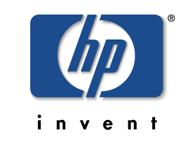
- Many HP Printers have a built-in page-countafter which they won’t work – resides in a part called image or drum-kit. You can reset the NV ram but it comes with risks. So instead of sending it for repair, it’s more economical to purchase a brand new printer.
- If a set of cartridges cost more than the printer, don't buy the printer because it was categorized as “throw-away” printer in the first place.
- HP cartridges have a warranty separate from their printer – when your printer is out of warranty, the cartridges might not be and you can call the tech service.
- Any HP printer that has been on the market for 6 months has its tech support outsourced – so when you call for support after the period, chances are you’re speaking to an Indian, a Costa Rican or a Canadian.
- If your printer is having a problem and unfortunately it is just out of warranty, proceed to call tech support anyway – you’ll be directed to a “warranty agent” and if you insist you have an “extended warranty”, you’ll then be forwarded to technical support under “customer claims warranty". The Tech AgentMUST give you support as per HP policy.
- If you threaten a lawsuit, HP CSRs are told to stop the call immediately and hang up – so don’t yell or threaten them.
A Sweet Valentine Gift From Bernanke
With this comment, he suggested he is comfortable with current interest rate level, which is what the stock market is looking for. The Dow Jones industrial average climbed more than 87 points, or 0.7 percent, to a record of 12,741.86, and the broader S&P500 rose 0.8 percent to hit 1,455.30, its highest point in more than six years.
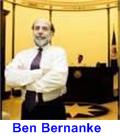 “Inflation pressures appear to have abated somewhat … A waning of the temporary factors that boosted inflation in recent years will probably help foster a continued edging down of core inflation” Ben said.
“Inflation pressures appear to have abated somewhat … A waning of the temporary factors that boosted inflation in recent years will probably help foster a continued edging down of core inflation” Ben said.Fed forecasts that the economy will expand by 2.5 to 3 percent this year, 2007; that unemployment will remain low at about 4.75 percent, which is near what many economists consider full employment; and for core inflation, excluding energy and food prices, to hover just above 2 percent.
Mr. Bernanke said that last year’s slowdown in housing might have stabilized, adding that the weakness in housing had not spilled over to other parts of the economy. However he cautioned that the biggest risk to economic growth was that the housing market would continue to plunge, dragging down consumer spending and investment. Another risk is that energy prices, which have declined sharply in recent months, might climb rapidly again and begin to affect consumer prices in general.
This good news is definitely a factor which will contribute to the bullish stock-market in other region including Asia. Already you can see Singapore and Malaysia stock market have registered new highs over the time. And with the central bank to follow suit by leaving the interest rate unchanged, the businessman can be relieve that their profit will not goes into paying borrowing’s interest.
Wednesday, February 14, 2007
Will GUESS Defy Gravity And Continue 45 Degrees Uptrend?
Rating Indicators for GES:
- StockScouter rating : 4 / 10
- Whisper Number for this stock : N/A
- Schaeffer rating for this stock : 8 / 10
- Power Rating : 4 / 10
- Insider Trading (last 52 weeks) : ($268.46M)
- Zacks Analysts Rating: Moderate Buy
- Option Trading: June 2007 75 Call
- Implied Volatility (IV) for June 2007 $75.0 Strike : 41.28%
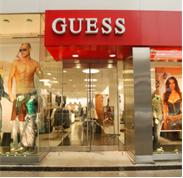 Sales, Income & Growth - For the past 12-months, GUESS registered $1.12 Billion sales versus the industry’s $3.01 Billion. Income amounted to $103.29 Million against the industry’s $216.06 Million. While GUESS 12-months sales growth is at 27.20%, the income growth is in the region of 134.70% (the same industry sector sales growth is at 12.20% and income growth of 26.70%).
Sales, Income & Growth - For the past 12-months, GUESS registered $1.12 Billion sales versus the industry’s $3.01 Billion. Income amounted to $103.29 Million against the industry’s $216.06 Million. While GUESS 12-months sales growth is at 27.20%, the income growth is in the region of 134.70% (the same industry sector sales growth is at 12.20% and income growth of 26.70%).
Profitability & Financial Health – For the past 12-months, net profit margin is in the region of 9.3%. GUESS has a debt/equity ratio of 0.22 compare to industry’s ratio of 1.90.
Stock Resistance & Support Level – The resistance is at 78.85 (52-week high) while the first level support is at 67.86 (50-day moving average).
Risks – The price-to-earnings multiple, 33.70 is higher than the average industry level. Two or more executives, board directors or major shareholders - including one high-level executive: sold a large number of shares recently.
Though all the figures above points to a pessimistic view, especially when there’re quite a number of high-level executives selling GUESS stocks, I still think GUESS will be able to beat earning estimate. But I wouldn’t bet my arm & leg on this stock, perhaps a small amount of Call options. Note that Feb 2007 70 and 75 Put option has been bid-up at this moment - could the insiders know something bad about this stock? But it could be someone playing spread strategy as well.
Citigroup Sell Red Umbrella Back To Travelers
 The 137-year-old logo red umbrella logo originally used by St. Paul Travelers Companies. Mr. Weill made the Travelers Group logo famous when he merged that company with Citicorp in 1998. Citigroup’s chairman and chief executive, Charles O. Prince III said “Our research continued to show
The 137-year-old logo red umbrella logo originally used by St. Paul Travelers Companies. Mr. Weill made the Travelers Group logo famous when he merged that company with Citicorp in 1998. Citigroup’s chairman and chief executive, Charles O. Prince III said “Our research continued to show  that the trademark red umbrella was more connected with insurance, specifically St. Paul Travelers,”
that the trademark red umbrella was more connected with insurance, specifically St. Paul Travelers,”Jay S. Fishman, St. Paul Travelers’ chairman and chief executive, said the value of the deal was in the millions. St. Paul Travelers, which was formed after Citigroup spun off Travelers and the St. Paul Companies later acquired it, will change its name to Travelers and will switch its stock ticker to TRV from STA.
I agreed the red umbrella is more suitable for an insurance company. I didn’t like the red umbrella from the start anyway. It looks sickening. If you’re loaded with free cash, why don’t you try to buy the 16-foot 5,300-pound steel sculpture outside Citigroup bank in Lower Manhattan? Who knows, you might make a great fortune auctioning the sculpture later on. Better than investing stocks, I guess.
Lottery Question - Is UMNO A Political Or Business Entity?
 UMNO will buy 25 per cent of PECD,a loss-making firm with a RM1.4 billion order book, a move that could help the company settle its disputes with government-related bodies. The existing major shareholders of PECD include Tan Sri Mohd Razali Abdul Rahman, Nik Sufian Mohd Zain and Datuk Othman Hashim with a collective 32.18 per cent, its 2005 annual report showed. Peremba PJ Holdings Sdn Bhd also holds another 26.11 per cent.
UMNO will buy 25 per cent of PECD,a loss-making firm with a RM1.4 billion order book, a move that could help the company settle its disputes with government-related bodies. The existing major shareholders of PECD include Tan Sri Mohd Razali Abdul Rahman, Nik Sufian Mohd Zain and Datuk Othman Hashim with a collective 32.18 per cent, its 2005 annual report showed. Peremba PJ Holdings Sdn Bhd also holds another 26.11 per cent.PECD swung to a third-quarter net loss of RM34.4 million as at September 30 2006 versus a net profit of RM6.3 million in the same period a year earlier. The loss was due mainly to slow progress of works from ongoing projects, reversal of profits recognized from certain completed projects and non-recognition of profits from its Sudan marine terminal project.
 It was reported that UMNO is supporting PECD's effort to resolve differences with state oil and gas firm Petroliam Nasional Bhd (Petronas) and state-owned property developer Putrajaya Holdings (PJH). PECD is claiming some US$200 million (RM700 million) in cost overruns for a project to build a marine terminal in Sudan. The project, to build oil storage tanks and fuel tanks among others, was awarded by a group of oil companies led by Petronas.
It was reported that UMNO is supporting PECD's effort to resolve differences with state oil and gas firm Petroliam Nasional Bhd (Petronas) and state-owned property developer Putrajaya Holdings (PJH). PECD is claiming some US$200 million (RM700 million) in cost overruns for a project to build a marine terminal in Sudan. The project, to build oil storage tanks and fuel tanks among others, was awarded by a group of oil companies led by Petronas.PECD is also claiming RM178 million from PJH after the latter issued a termination notice for PECD to stop work on a government quarters project in Putrajaya.
It seems Malaysia government is one of the most flexible entities in the world looking at current situation. Besides crossing border from Executive to Legislative and then Judiciary pillar, now these groups of politicians are in such a creative mode to land their hands on business. Just what type of government is this? Where does UMNO intend to get the funds to secure the deal? Or am I too naïve to think that UMNO is not already cash-rich for such acquisition? Most importantly, is UMNO in politic or in business? No prize for giving the right answer.
Locked Option Trading Profit - Inspired By Superman-Li
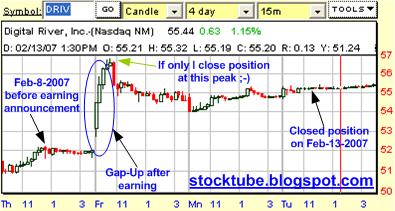 Digital River Inc.(Nasdaq:DRIV, stock) reported alower fourth-quarter profit and reduced its forecasts for the first quarter and full-year 2007. Digital River earned $16.4 million, or 36 cents per share, compared with a restated $18.1 million, or 45 cents per share, for the same quarter in 2005. Excluding stock-option expenses and other charges, Digital River reported 47 cents per share beating earning estimate polled by Thomson Financial of 46 cents per share. Revenue rose to $83 million against expected $82.4 million.
Digital River Inc.(Nasdaq:DRIV, stock) reported alower fourth-quarter profit and reduced its forecasts for the first quarter and full-year 2007. Digital River earned $16.4 million, or 36 cents per share, compared with a restated $18.1 million, or 45 cents per share, for the same quarter in 2005. Excluding stock-option expenses and other charges, Digital River reported 47 cents per share beating earning estimate polled by Thomson Financial of 46 cents per share. Revenue rose to $83 million against expected $82.4 million. Despite that, the stock price climbed after analysts decided to support and gave it a pat on the back. Digital River now predicts 44 cents per share in profit for the first quarter and $1.86 per share for the year, including stock-option expenses. Deutsche Bank analyst Jeetil Patel said the forecasts were still in line with Wall Street predictions, and the stock is trading at a discount – reiterated a “Buy” rating with $65 stock price target. BMO Capital Markets analyst Leland Westerfield raised his 2007 and 2008 projections for the company, saying 2006 may mark the beginning of an upturn for the stock.
Such is the power and influence of analysts. Of course one of the reason I invested this stock is because its’ $55 Call option was being bid-up. Looking at the chart, did you notice the stock price peaked on the day after the earning announcement? If only I sell at that moment …
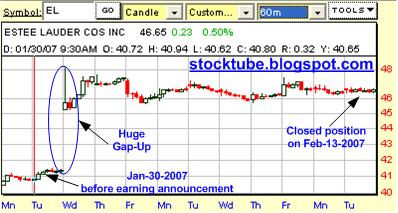 Estee Lauder Companies Inc. (NYSE: EL, stock) – what else can I say about this stock other than “I love it” (its’ Valentine today dude). It reported fiscal second-quarter profit of more than doubled on higher sales and lower costs, prompting it to lift its full-year outlook – and the analysts just love it.Buckingham Research raised the rating to "Accumulate" from "Neutral" for Estee Lauder whileDeutsche Bank praised the company's efforts to look outside of the traditional U.S. department store "comfort zone" maintaining a “Hold” rating.
Estee Lauder Companies Inc. (NYSE: EL, stock) – what else can I say about this stock other than “I love it” (its’ Valentine today dude). It reported fiscal second-quarter profit of more than doubled on higher sales and lower costs, prompting it to lift its full-year outlook – and the analysts just love it.Buckingham Research raised the rating to "Accumulate" from "Neutral" for Estee Lauder whileDeutsche Bank praised the company's efforts to look outside of the traditional U.S. department store "comfort zone" maintaining a “Hold” rating. Leveraging on the good result, I was actually hoping for it to gain more momentum after the first day of the earning announcement. But as the chart has proven, for the next subsequent 7-days post-earning, the stock stubbornly stay below $48 but above $46. To liquidate my position for other trades, I decided to take profit. Furthermore it’s a 169% profit for a 10-days trade. I’m happy with the profit.
 Mattel Inc. (NYSE:MAT, stock) beat estimates when strong sales of Barbie and Fischer-Price, along with the high demand for the T.M.X. Elmo boost the fourth-quarter profits by 3%. In the quarter, the company earned 75 cents a share beat analyst estimates of 67 cents a share. I expected a nice gap-up but it gave me a small un-sustainable gap which lasted for another three days before it started an uptrend thereafter.
Mattel Inc. (NYSE:MAT, stock) beat estimates when strong sales of Barbie and Fischer-Price, along with the high demand for the T.M.X. Elmo boost the fourth-quarter profits by 3%. In the quarter, the company earned 75 cents a share beat analyst estimates of 67 cents a share. I expected a nice gap-up but it gave me a small un-sustainable gap which lasted for another three days before it started an uptrend thereafter. Looking at the chart you can see how the uptrend stopped at the resistance of $26.5 on Feb-8-2007. Hence when it hit the same spot again, I closed my position to lock-in profit. Because the Apr 25 Call was quite cheap, my 50 contracts managed to bring in good profit of over US$5000. What do you expect from a 2-week trade with over 130% profit? Can’t be too greedy or risk the punishment – I’m actually a bit nervous with the Dow Jones and Nasdaq current level.
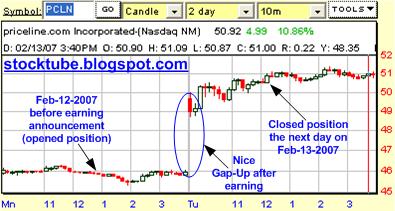 Priceline.com Incorporated (Nasdaq: PCLN, stock) reported a fourth-quarter profit that more than tripled and forecast first-quarter sales above analyst estimates. The result – the stock price soared and hit a new 52-week high of $51.39. Its quarterly profit was lifted by strong bookings internationally from its European brand, Booking.com.
Priceline.com Incorporated (Nasdaq: PCLN, stock) reported a fourth-quarter profit that more than tripled and forecast first-quarter sales above analyst estimates. The result – the stock price soared and hit a new 52-week high of $51.39. Its quarterly profit was lifted by strong bookings internationally from its European brand, Booking.com.Merrill Lynch analyst Justin Post said that while growth in Europe continues to top guidance,strength domestically was a bigger surprise and was likely helped by higher fares and prices for travel products. Post also said Priceline.com may be benefiting from transaction-related distraction at Travelocity.com that has left continental Europe temporarily less competitive.
Piper Jaffray & Co. analyst Aaron Kessler kept an "Outperform" rating on the shares while raising his price target by $5 to $66. Kessler said Priceline.com is one of his top picks in the e-commerce sector because of its strong international growth prospects, increasing operating leverage and conservative Wall Street expectations. Kessler also believes that the company's guidance is conservative as it assumes a marked deceleration in both domestic and international bookings despite recent momentum.
I closed the position after the 45-minutes into trading and the stock seems to find hard to breach the highest point within the period. This disturbed me very much of which I preferred to take money off the table. Unfortunately it couldn’t breach the 100% profit within 1 day.
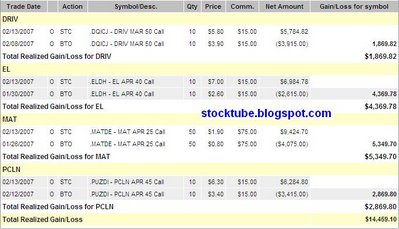
Other Articles That May Interest You ...
NVIDIA Should Beat Earning But Concern On Inventory
Rating Indicators for NVDA:
- StockScouter rating : 9 / 10
- Whisper Number for this stock : 0.44
- Schaeffer rating for this stock : 6 / 10
- Power Rating : 6 / 10
- Insider Trading (last 52 weeks) : ($157.87M)
- Zacks Analysts Rating: Hold
- Option Trading: June 2007 32.5 Call
- Implied Volatility (IV) for June 2007 $32.5 Strike : 44.53%
Sales, Income & Growth - For the past 12-months, NVIDIA registered $2.82 Billion sales versus the i ndustry’s $1.41 Billion. Income amounted to $381.27 Million against the industry’s $277.44 Million. While NVIDIA 12-months sales growth is at 25.70%, the income growth is in the region of minus 39.70% (the same industry sector sales growth is at 19.00% and income growth of 18.40%).
ndustry’s $1.41 Billion. Income amounted to $381.27 Million against the industry’s $277.44 Million. While NVIDIA 12-months sales growth is at 25.70%, the income growth is in the region of minus 39.70% (the same industry sector sales growth is at 19.00% and income growth of 18.40%).
Profitability & Financial Health – For the past 12-months, net profit margin is in the region of 13.5%. NVIDIA has a debt/equity ratio of zero compare to industry’s ratio of 0.02.
Stock Resistance & Support Level – The resistance is at 34.77 (50-day moving average) while the first level support is at 28.98 (200-day moving average).
Risks – The price-to-earnings multiple, 33.70 is higher than the average industry level.
In the last quarterly report, CEO Jen-Hsun Huang said that the future rests on new technologies and NVIDIA was rolling out "the most ambitious chips in the company's history". The only concern is the figure to be announced on the inventory levels. NVIDIA ended its third quarter with inventories 31.4% higher than year-ago levels, far outpacing the revenue growth. However I think NVDA will beat earning this time around. Furthermore Apple Inc (Nasdaq: AAPL, stock) has done great with its earning.
NVDA competitors includes:
Tuesday, February 13, 2007
ASTRO Measat-3 Facing Problem Migrating Channels
Measat 3, which replaces Measat 1, has a mission lifespan of 15 years. The new satellite is more powerful and will give Measat greater transmission and reception capabilities – at least that’s what it supposed to deliver after spending billions of Malaysia ringgit on it. And it took another nine days since the launched for Measat to be sure it’s working fine.
 Astro All Asia Network Plc (KLSE: ASTRO, stock-code 5076), on the other hand hopes the launch of the much-delayed Measat 3 satellite will boost its bottom line. Chief operating officer David Butorac said the new satellite, with 24 transponders (equipment on board the satellite that receives and retransmits signals), would allow Astro to increase up to 50 more channels.
Astro All Asia Network Plc (KLSE: ASTRO, stock-code 5076), on the other hand hopes the launch of the much-delayed Measat 3 satellite will boost its bottom line. Chief operating officer David Butorac said the new satellite, with 24 transponders (equipment on board the satellite that receives and retransmits signals), would allow Astro to increase up to 50 more channels.Despite being a pay-television, the 8 million Malaysia viewers are being feed with advertisements when it should be ads-free.Astro has the nerve to comment that it will continue to air advertisements because they contributed about RM150mil to the company's coffers yearly. In Malaysia where competition is a rare commodity and monopoly by big and political-linked companies are the de-facto of doing business, end-users seem to have no other choice but to keep silent with their hands tied.
But what happen since then? It seems the integration or migration of the channels to the new Measat-3 is hitting the walls for some subscribers. There were reports especially high-rise residential viewers that there’re many channels “missing” from their subscription. “Service Is Not Available” was the greeting message when most of the condominium residents try to select their favorite channels since three days ago.
What made subscribers furious was the dinosaur-age service-level provided when the affected customers made a call to customer support (Astro website shows old obsolete number which will re-direct callers to 1300-82-3838 instead) only to be greeted with “Customer Service reps are busy … Please wait” and put onto music and advertisements for hours.
When the customer service reps finally called up, the Astro’s customers were then told to perform some stupid steps such as on & off the decoder to be on standby mode failing which customers were given another number to call which turns out to be sub-contractors who only do first-time installation jobs. Astro further put the blame on high-rise management with lame-excuses that the problem could be due to wiring and so on. “But before the migration everything was working fine” – a subscriber said. It seems the company owned by Ananda Krishnan is interested in nothing more than sucking the money from the customers without thinking about the quality services that the subscribers are entitled to.
This is another classic example of how monopoly will never benefit public as a whole.
Superman Li Ka-shing Has Done It Again
Superman Li has done it again. Billionaire Li Ka-shing has just pocketed a huge profit from the sale of a controlling stake in Indian mobile carrier Hutchison Essar Limited to Vodafone Group Ltd (NYSE: VOD) for US$ 11 billion (his investment was said to be only US$2 billion). 78-year-old Li has the magic mind of knowing when to buy and sell. In fact this is the basic fundamental that all the investors, regardless of whether its’ stocks, option, futures, gold, currency, properties and others, should know in order to realize the profit. You  should know when to lock-in profit. You can never sell at the highest nor buy at the lowest. As long as your investment is making profit and hit your target of profitability, you should take money off the table.
should know when to lock-in profit. You can never sell at the highest nor buy at the lowest. As long as your investment is making profit and hit your target of profitability, you should take money off the table.
Easier said than done? I bet, or else most of us can take over Li Ka-shing’s seat as the next superman. Through his Hutchison Whampoa Ltd (HKG: 0013) and Cheung Kong (HKG: 0001) flagships, Li owns the world's largest operator of container ports, the biggest health and beauty retailer, and Canada's No. 4 oil company. Li is ranked 10 among the world’s richest people in 2006.
Li started the plastic flower business when the demand was high and through years of saving, he expanded his focus to property seeing the opportunity for the ever-increasing migration from mainland China. But instead of becoming a merely local-champion, he expanded his business overseas to become a global player in countries such as Canada, Europe, Australia and China.
 He tried his luck in America but his close relationship with Chinese government was not liked by the previous Clinton administration. Li was a member of the boards of directors of the China International Trust and Investment Corporation (CITIC). CITIC is the bank of the Chinese army (People's Liberation Army, or PLA), providing financing for Chinese army weapons sales and Western technology purchases.
He tried his luck in America but his close relationship with Chinese government was not liked by the previous Clinton administration. Li was a member of the boards of directors of the China International Trust and Investment Corporation (CITIC). CITIC is the bank of the Chinese army (People's Liberation Army, or PLA), providing financing for Chinese army weapons sales and Western technology purchases.
Though his empire is family-own, he includes foreign expertise as part of his top management team. In 1999, he sold Hutchison Whampoa's Orange cell-phone business in Europe to Mannesmann at the height of the telecoms boom at a profit of US$ 15 billion. In 2006, 20% of Hutchison's ports business was sold to Singapore’s PSA Corp at a profit of US$ 3.12 billion. He just knows when to take profit off the table. Have you heard of money-make-money theory? If you hold and never cash-out, your limited money can never grow at a larger scale. This is perhaps the difference between Li and Warren Buffett. While Li create 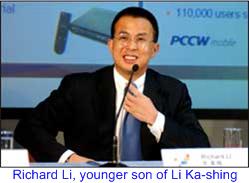 business and sell it for a mind-boggling profit, Warren invests in value stocks whose company’s business he understood and holds on almost forever.
business and sell it for a mind-boggling profit, Warren invests in value stocks whose company’s business he understood and holds on almost forever.
However while Li is indeed a superman who doesn’t looks like he’s going to retire soon, I’m worry on his successor. While his elder son Victor Li is low-profile, the younger Richard Li known for his Pacific Century CyberWorks (HKG: 0008) investment is a person who likes flamboyance and taste for the limelight and doesn’t seems to have a dispassionate character of his father. Nevertheless both do not have the equal ability to sniff good investing opportunity.
"Wealth will not pass beyond three generations" warns a Chinese proverb. Will Li Ka-shing descendant faces the same fate?
Other Articles That May Interest You ...
Monday, February 12, 2007
Option Trading - Will Priceline.com Gain Market Share?
- StockScouter rating : 5 / 10
- Whisper Number for this stock : N/A
- Schaeffer rating for this stock : 7 / 10
- Power Rating : 5 / 10
- Insider Trading (last 52 weeks) : ($100.4M)
- Zacks Analysts Rating: Hold
- Option Trading: Apr 2007 45 Call
- Implied Volatility (IV) for Mar 2007 $45 Strike : 39.09%
 industry’s $4.05 Billion. Income amounted to $63.10 Million against the industry’s $439.49 Million. While Priceline.com 12-months sales growth is at 13.70%, the income growth is in the region of minus 68.30% (the same industry sector sales growth is at 27.40% and income growth of 88.10%).
industry’s $4.05 Billion. Income amounted to $63.10 Million against the industry’s $439.49 Million. While Priceline.com 12-months sales growth is at 13.70%, the income growth is in the region of minus 68.30% (the same industry sector sales growth is at 27.40% and income growth of 88.10%).Thomas Weisel analyst Jake Fuller said Priceline demonstrates strong domestic performance with potential upside and expect it to gain market share in the last quarter due to fast-growing European markets. Furthermore more people were said to be spending their holidays elsewhere during the winter season. So I think Priceline should beat the estimate earning again this time. I’m a bit worry about its’ high P/E though.
Stock Market Bull - A Feel Good Factor For General Election?
I still believe the current bull is artificial. If it’s artificial, there could only be one explanation – the government of Malaysia is behind it. Do I have to explain more on how the government managed to push up the composite index? And if the government is the culprit, there could only be one reason –the “General Election” is happening this year.
In fact the preparation for the election was already on the way since fourth quarter last year when the bumpy and ugly roads were given cosmetic treatment – the first sign of coming general election in Malaysia. Then this year you heard good news after good news being splashed across all the media. Even Reuters picked up the sensation and the feeling of a snap poll this year.
Amongst the good news being trumpeted by government-controlled media includes:
- Record 2006 trade volumes
- Skyrocket stock market composite index
- Stronger ringgit
- Rising Foreign Reserve
- Feel good factor stories sung by ministers again and again
Asides from the media propaganda, men on the street can tell that the real economic situation is not that rosy. Inflation due to the fuel-price hike has taken much of the toll. People who used to drive to work have opted to ride on motorcycle instead. People are tightening their belt – you will noticed the Carrefour has not attracted the crowds it used to get during the weekend last minute shopping before the Lunar New Year celebration which is less than a week away.
Jobs are not abundance and employees are preparing for the worst – job-cuts, no bonus or no pay increment at all. Without many jobs around, people are not spending as luxurious – car sales are not registering good booking either. Property sales are sluggish except those in the less than $200,000 ringgit bracket and even this type of property buyers are mainly first-timer.
If the government were to announce more goodies such as pay-rise for civil service and a fuel-price revision at a later stage, then it’s pretty much confirmed the general election is around the corner. So what should you do with the current 10-year high stock composite index? Sell your old portfolios (if you have any) if it’s already break-even (or even with a small loss) else you might need to wait another five years before the next general election.
Other Articles That May Interest You ...
Sunday, February 11, 2007
Shadow Of Macau Triads Haunting Singapore?
Ever since the news broke about the swapping of interest between Star Cruise Ltd (SIN: S21) and Stanley to enable both to gain entry to Macau and Singapore casino business respectively, “Red Alert” was triggered by Singapore
 authorities. But Sentosa Integrated Resort’s assistant communications director, Jackson Loy, said that Ho would not have any stake in the resort.
authorities. But Sentosa Integrated Resort’s assistant communications director, Jackson Loy, said that Ho would not have any stake in the resort.A Home Affairs statement said: “The Casino Regulation Division is seeking clarification from Star Cruises / Genting International (SIN: G13) about the share placement and other deals in Macau.” The concern could be due to the fact that Stanley’s daughter; Pansy is working with MGM Mirage group (NYSE: MGM, stock) to build a casino in Macau which prompted New Jersey regulators to check the deal.
Rumors said amongst others, triads are operating within Stanley’s private gaming roomswhere loan-sharking and money laundering allegedly takes place. If this is true, it’s not a surprise at all considering Stanley has been monopolizing and almost rule the land of Macau for the last 40 years within his throne before Macau was handed back to China and his monopoly broken subsequently.
But question remains if Genting will be able to set its’ foot on Macau’s soil now that Stanley will not be allowed into Star Cruises stake and indirectly Sentosa IR at all. As what I’ve blogged prior, there’s no value in having Stanley into Sentosa’s IR at all. And if there’s no value, why should Singapore let the partnership materialize knowing that social risk such as loan-sharking will flourish? It'll be interesting to see the effect on the stock price once it's confirmed Genting will not penetrate into Macau's casino business after all.
Other Articles That May Interest You ...
Why DiGi Should Be Granted WIMAX License?
 5304).
5304).You might argue that only when the government is out of money for further bail-out was the hard-decision to let go the controlling stakes in these ailing companies to foreigners is made. But the fact remains that in order to attract foreign investors, some liberalizations are needed to at least show the seriousness from the government side.
After the financial sector, it’s time for the telecommunication (Telco) to follow next. DIGI.com Berhad (DIGI : stock-code 6947), the only foreign-owned Telco player in Malaysia, denied the 3G license, it’s time DIGI be awarded the WIMAX license. It was a shame decision to award 3G license to loss-making Time DotCom Berhad (TIMECOM : stock-code 5031) and unlisted pay-TV operator MITV Corp earlier. And what do you see since then? Nothing is happening despite owning the 3G licenses. The other 3G player Telekom Malaysia (TM : stock-code 4863) and Maxis Communications (MAXIS : stock-code 5051) is not moving as well. Here are some justifications:
- Despite being the smallest mobile operator, DIGI is one of the most profitable, efficient and innovative Telco companies in Malaysia. When it launches a new product or marketing plan to consumers, all the others listen and follow. Somehow DIGI is the leader in Telco arena. DiGi chief executive officer Morten Lundal has said DIGI promised to invest hundreds of millions of ringgit to roll out high-speed mobile Internet services if it wins a WIMAX license.
- DiGi, as of September 30 2006, had more than RM1.13 billion cash in hand (excluding the RM700 million unused commercial papers and medium-term notes). It’s better to allow DiGi re-invest this huge chest back to infrastructure than giving them no choice but to sit idling or relocate the funds to elsewhere out of Malaysia. Malaysia is a follower now to Singapore despite started the MSC (Multimedia Super Corridor) ahead of them. It’s time to leap-frog to catch-up with the rest of the countries.
- Malaysia needs competition to move forward – a comparison of how a stubborn mule needs a carrot to make it move. Telekom is too big and complacent a company to provide any impetus. Maxis is not as innovative as before – its’ growing work-force created much bureaucracy and efficient decision-making is a rare commodity nowadays. It too became too complacent as of now. Forget about Time DotCom and MITV – they’ve far more internal problems to think of than to profit from the 3G they won. And DiGi is the only company which can provide the competition and business-threat to pull everyone.
It’s time the government starts learning to make wise and feasible decision based on the nation’s benefits and not handicapped political policies. Otherwise, even poor countries such as Vietnam or Indonesia will wave their hands to Malaysia saying “Sayonara dude”.
Other Articles That May Interest You ...
Friday, February 09, 2007
Stay In 5-Star Hotel For Less Than USD3 Dollars
Just like Tony Fernandes successful low-cost  carrier, AirAsia Berhad (KLSE: AIRASIA, stock-code 5099), Tune Hotels.Com will offers basic amenitiessuch as a deluxe five-star bed by King Koil, 250-thread count white duvets, an ensuite "Power Shower" and a ceiling fan. For extra comfort, guests have the option to purchase items like towels and air-conditioning cards.
carrier, AirAsia Berhad (KLSE: AIRASIA, stock-code 5099), Tune Hotels.Com will offers basic amenitiessuch as a deluxe five-star bed by King Koil, 250-thread count white duvets, an ensuite "Power Shower" and a ceiling fan. For extra comfort, guests have the option to purchase items like towels and air-conditioning cards.
Fernandes said Tune Hotels.Com would be opening its hotels in Penang, Johor Bahru, Kuching and Kota Kinabalu in the near future. Director and co-founder Dennis Melka said Tune Hotels.Com would also leverage on smart partnerships to carry out advertising on the hotel room floors and stairways, adding that it would sell online Tune Beds made by KingKoil Corporation Sdn Bhd. Its other commercial partners are Pensonic Holdings Bhd (KLSE: PENSONI, stock-code 9997), Nippon Paint (M) Sdn Bhd, Johnson Suisse (Malaysia) Sdn Bhd and Dignified Square (M) Sdn Bhd.
Tune Hotels.Com will have Uncle John  Kopitiam and MyNews.Com as its retail partners operating at the hotels.
Kopitiam and MyNews.Com as its retail partners operating at the hotels.
It was reported that AirAsia Bhd's chief executive officer Fernandes, along with shareholders Datuk Kalimullah Hassan, Dennis Melka and Lim Kian Onn, among others, had incorporated Tune Hotels last December with a paid-up capital of RM5.2 million. One of the directors of the company is Ivo Nekvapil, a well-known hotelier in Malaysia.
Tune Ventures Sdn Bhd owns 55.8 percent of Tune Hotels. It is understood that Fernandes, along with AirAsia's deputy group chief executive officer Kamarudin Meranum and other partners, are the shareholders of Tune Ventures. The second-largest shareholder of Tune Hotels is Tune Hotels.Com (BVI) Ltd, with 17%, while Kalimullah and Lim own 12.5% each.
Online booking for the rooms starts from March-1-2007 and official launching will be on March-28-2007. Don't you love and amazed with the creativity of this Tony Fernandes? In fact Malaysia has tons of talents and should the government provide a fair playing ground without adopting ethnic discrimination, the country should have enjoy a more developed nation in the region.
# TIP: You can book rooms at the following TuneHotels Online Booking
How Time-Value Salvage My BGC Option Trading
My latest example would be a good classic case-study. In case you just happened to drop-by at my website, StockTube for the first-time, I did a option trading on General Cable Corporation(NYSE: BGC, stock) back in Oct-30-2006. You hear me right, that’s more than four months ago. I bought BGC Feb 2007 40 Call just before it announce its’ earning (full website here). It beats earning by $ 0.16 but because it issued a mix-guidance (report here) its’ stock was punished and gapped-down.
 It did recovered somewhat but not enough to break-even (I was stubborn enough not to cut-loss because I believe in its’ fundamental). The worst thing (look at the chart) is it didn’t able to break the resistance of $45 and slowly the time-value waterfall started to eat into my premium.
It did recovered somewhat but not enough to break-even (I was stubborn enough not to cut-loss because I believe in its’ fundamental). The worst thing (look at the chart) is it didn’t able to break the resistance of $45 and slowly the time-value waterfall started to eat into my premium. Subsequently the next quarter earning announced on Feb-7-2007 provide much relieve when it reported quarterly earnings after preferred dividends of $35.3 million, or 67 cents per share with revenue rose to $925.3 million. Wall Street expected a quarterly profit of 59 cents per share on $923.9 million in revenue. More than that the company issued first-quarter upside guidance of 75 cents per share on sales of $950 million to $1 billion.
Subsequently the next quarter earning announced on Feb-7-2007 provide much relieve when it reported quarterly earnings after preferred dividends of $35.3 million, or 67 cents per share with revenue rose to $925.3 million. Wall Street expected a quarterly profit of 59 cents per share on $923.9 million in revenue. More than that the company issued first-quarter upside guidance of 75 cents per share on sales of $950 million to $1 billion.
This time there’s no mistake – the stock price shot up after normal market hour and I took this last chance to close the position with a little profit.
# TIP: Always invest with abundance of time-value during your option trading unless you're willing to lose all or cut-loss depending on the your investing strategy.
Billionaire Quek Building New Gaming Empire
 One, if their companies are Chinese-majority owned, then they are on their own comes any new internal or external financial crisis without much assistance hope from the government (the government would itself too busy ailing bumiputra companies).Two, in order to continue surviving they need to expand out of Malaysia for new prospect as the local market is already crowded due to too many players eyeing a small market (Malaysia has 27 million population only).
One, if their companies are Chinese-majority owned, then they are on their own comes any new internal or external financial crisis without much assistance hope from the government (the government would itself too busy ailing bumiputra companies).Two, in order to continue surviving they need to expand out of Malaysia for new prospect as the local market is already crowded due to too many players eyeing a small market (Malaysia has 27 million population only).Quek Leng Chan is a very low-profile businessman. He rarely appears on any business news and when he made a headline, you better pay attention as it will give you some indication where he’s heading to on his next business course. After the “hostile” takeover of Southern Bank Berhad (one of the most profitable and well-managed Chinese-based banks) by CIMB Group whose chief executive officer, Datuk Nazir Razak who is also the brother of current Deputy Prime Minister, Najib Razak, the writing is already on the wall that having an anchor bank status is not a guarantee that your bank built with decades of hard-work will not be taken over by force.
In a dog-eat-dog business world, it’s already hard to compete within the same sector, what more if political pressure is being used to swallow you up alive. Perhaps with all the messages since the 1997 Crisis and the Globalization, Chinese conglomerates in Malaysia have already started to look elsewhere to divert or relocate their wealth in the name of diversification. Even Robert Kuok, another self-made billionaire has recently announced Kuok Group Consolidates To Defend Palm Oil Business.
Genting Berhad (KLSE: GENTING, stock-code 3182) through its’ subsidiary Genting International (SIN : G13) and Star Cruise Ltd (SIN : S21) recently won the Singapore second casino on the Sentosa Integrated-Resort (IR) island projects after lost a bid earlier for the first casino license in Singapore to Las Vegas gaming giant Las Vegas Sands Corp. (NYSE : LVS, quote). And the most recent buzz on the gaming industry was the partnership of Genting, Stanley And Chua - The New Three Musketeers but
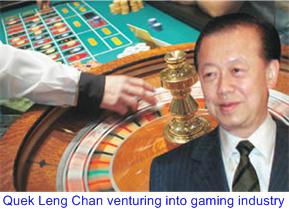 somehow Singapore Was Offended By The Deals.
somehow Singapore Was Offended By The Deals.And it seems Quek Leng Chan is serious about venturing into gaming industry himself having created two important headlines within the start of the 2007 New Year. Quietly, Quek who controls the Thistle Hotel chain has grabbed 25 of the 89 casino licenses awarded in Britain in the past two years. That is a remarkable 28% of permissions granted; a major coup for Quek Leng Chan who also owns Mayfair’s up-market Claremont casino. Others operators include:
- Stanley Leisure (owned by Genting Group) – secured licenses for 16 sites
- Aspinalls – secured 5 licenses
- Gala – bagged 3 licenses
The second headline catches today news when it was announced today that Quek buys 19.4% stake in MPHB for RM319 Million. Quek purchased 129.38 million shares and 95.62 million warrants in Multi-Purpose Holdings Berhad (KLSE: MPHB, stock-code 3859) at RM1.80 a share and 90 cents a warrant respectively. Multi-Purpose owns Magnum Corp Berhad (KLSE: MAGNUM,stock-code 3735), the number forecast operator.
It doesn’t take a rocket scientist to conclude where Quek Leng Chan is moving forward with the above headlines. Back in late Dec-2006, Quek was rumored to buy between 12 and 15 per cent into Kencana Petroleum Berhad (KLSE: KENCANA : stock-code 5122) but it has since been denied. It makes perfect sense to venture into gaming industry regardless whether it’s for long-term business plan or as an investment. You have to remember you’re dealing with a man who made billions of profit when he sold its Hong Kong bank Dao Heng to DBS Group Holdings Ltd (SIN: D05) for S$10 billion (HK$49.34 billion) in 2001. Maybe Quek sensed that his command-ship of Hong Leong will not lasts for long and he needs to prepare to jump boat when the time comes.
# TIP: I wouldn’t chase MPHB or MAGNUM stocks with the current high composite index which looks to start the major consolidation but will start accumulation in stages once it pull-back.
Other Articles That May Interest You ...
Thursday, February 08, 2007
DRIV - Digital River Call-Option Being Bid Up
Rating Indicators for DRIV:
- StockScouter rating : 7 / 10
- Whisper Number for this stock : N/A
- Schaeffer rating for this stock : 6 / 10
- Power Rating : 5 / 10
- Insider Trading (last 52 weeks) : ($1.68M)
- Zacks Analysts Rating: Moderate Buy
- Option Trading: Mar 2007 50 Call
- Implied Volatility (IV) for Mar 2007 $50 Strike : 42.98%
Sales, Income & Growth - For the past 12-months, Digital River registered $286.18 Million sales versus the industry’s $4.04 Billion. Income amounted to $62.18 Million against the industry’s $436.36 Million. While Digital River 12-months sales growth is at 41.40%, the income growth is in the region of 21.40% (the same industry sector sales growth is at 27.40% and income growth of 88.90%).
Profitability & Financial Health – For the past 12-months, net profit margin is in the region of 21.7%. Digital River has a debt/equity ratio of 0.35 compare to industry’s ratio of 0.40.
Stock Resistance & Support Level – The resistance is at 54.84 (50-day moving average) while the first level support is at 49.30 (200-day moving average).
Risks – The price-to-earnings multiple is higher than the average industry level. Also previous day's closing price for DRIV was slightly below its 50-day moving average.
On end of Jan-2007, Digital River announced that it is providing e-commerce services to support the online sale and download of 2007 Microsoft Office system products and Windows Vista in the United States. Digital River also provides e-commerce services and digital delivery for thousands of other third-party software titles through Microsoft's Windows Marketplace.
Note that the Call for $55 Strike is being bid-up for both Feb and Mar 2007 with quite a volume.
Just How Much Are YouTube Founders Getting From Google?
Nobody knew just how much each of the founders of YouTube will get from the acquisition until Google delivered the filing with the SEC (Securities and Exchange Commission) recently. The windfalls went to the following:
- Founder Steven Chen – 625,366 Google shares and an additional 68,721 in a trust, valued at $ 326.2 million.
- Third founder (who most of us is not aware of) Jawed Karim who left the company early on to pursue a graduate degree in computer science – 137,443 shares worth $ 64.4 million
- Sequoia Capital XI, the Sequoia fund that invested close to $11.5 million in YouTube from November 2005 to April 2006 – 941,027 shares worth $442.3 million
- Other funds either affiliated or managed by Artis Capital Management and Stuart L. Peterson – received 176,621 Google shares valued at $ 83 million.
- Several early employees who remain loyal with YouTube until now – received several thousands of Google shares.
So, you do not necessarily need to join a MNC (multi-national company) with billions of dollars of revenue with world-wide offices and tens or hundreds of thousands of employees in order to get the windfalls of fortune. If you joined the right start-up company which provide solutions in a niche, demanding yet innovative market (not every Tom, Dick and Harry is doing) and managed to secure millions of subscribers or participants, your future of becoming an instant millionaire as an employee is possible. But to maximize what you’ll be getting, it’s best the company is relatively small in order not to dilute the stock-sharing or allocation. This type of opportunity however does not knock on your door too often.







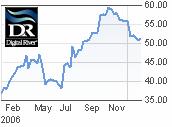

HOW I GOT MY LOAN FROM DR PURVA PIUS LOAN FINANCE (urgentloan22@gmail.com)
ReplyDeleteHello Everybody,
My name is Mrs Sharon Sim. I live in Singapore and i am a happy woman today? and i told my self that any lender that rescue my family from our poor situation, i will refer any person that is looking for loan to him, he gave me happiness to me and my family, i was in need of a loan of S$250,000.00 to start my life all over as i am a single mother with 3 kids I met this honest and GOD fearing man loan lender that help me with a loan of S$250,000.00 SG. Dollar, he is a GOD fearing man, if you are in need of loan and you will pay back the loan please contact him tell him that is Mrs Sharon, that refer you to him. contact Dr Purva Pius,via email:(urgentloan22@gmail.com) Thank you.
LOAN APPLICATION FORM:
=================
Full Name:................
Loan Amount Needed:.
Purpose of loan:.......
Loan Duration:..
Gender:.............
Marital status:....
Location:..........
Home Address:..
City:............
Country:......
Phone:..........
Mobile / Cell:....
Occupation:......
Monthly Income:....
Contact Us At :urgentloan22@gmail.com